Chickens
Can Chickens Eat Persimmons? Safe Feeding Tips
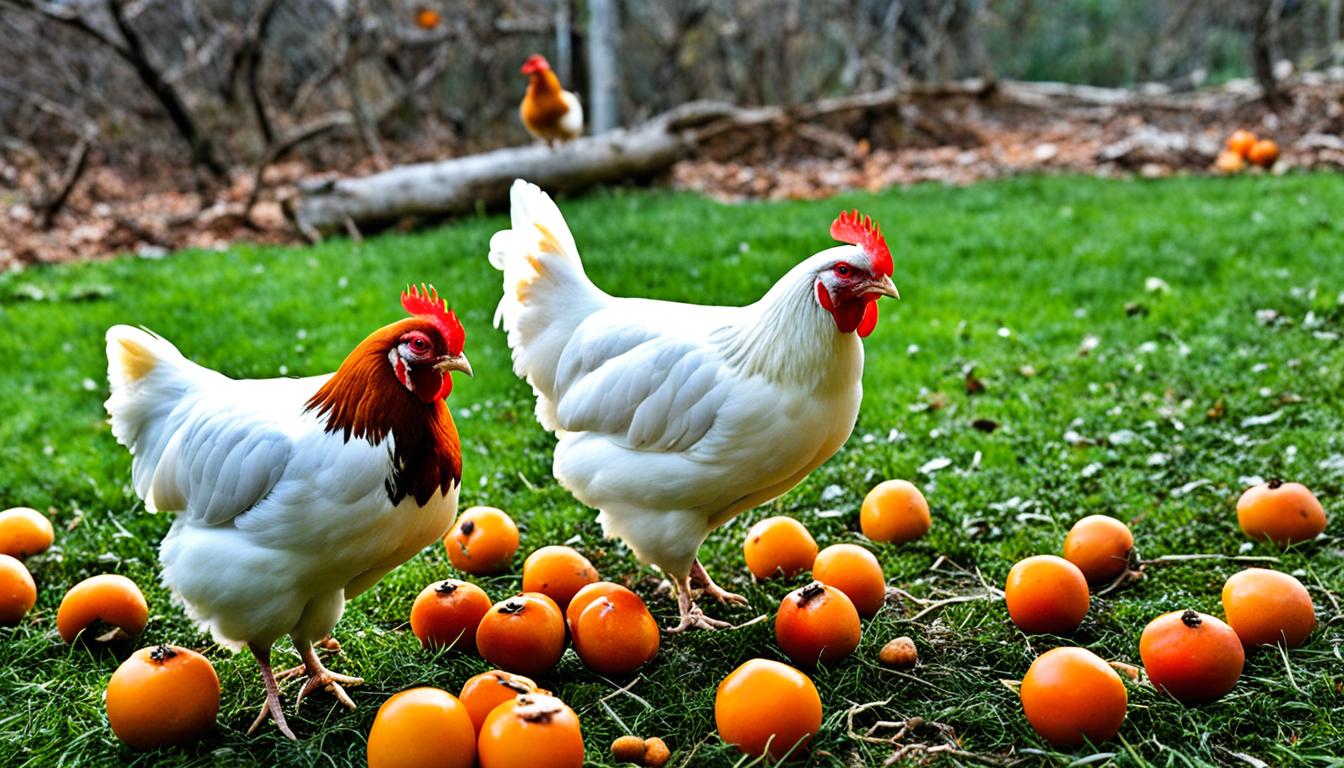
Did you know that chickens can enjoy a wide variety of fruits? However, when it comes to persimmons, the answer may surprise you. Yes, chickens can eat persimmons! These delightful fruits not only provide a sweet treat for your feathered friends but also offer nutritional benefits to support their overall health. But before you rush to share these fruits with your flock, it’s essential to know the safe feeding tips to ensure their well-being.
Key Takeaways:
- Chickens can safely eat persimmons in moderation.
- Persimmons provide a vitamin boost, especially during the cold winter months.
- It’s important to limit persimmon intake due to their high sugar content.
- Introduce persimmons gradually to chickens and observe their reactions.
- Consult with a veterinarian for personalized advice on feeding persimmons to your flock.
Persimmons: A Berry for Chickens
When it comes to feeding chickens, the options can sometimes seem limited. However, one fruit that can provide a tasty and nutritious addition to their diet is the persimmon. Whether it’s the Fuyu, Hachiya, or American variety, persimmons are considered a type of berry that chickens can safely enjoy.
Persimmons come in different sizes and colors, ranging from yellow to dark red or orange. This vibrant range adds visual appeal to the chickens’ diet while providing a delectable treat. Chickens are likely to enjoy the sweet and succulent taste of persimmons, making it a popular choice among poultry enthusiasts.
However, it’s important to exercise moderation when feeding persimmons to chickens. Just like other fruits with a high sugar content, persimmons should be given in limited amounts to avoid overindulgence. While chickens can benefit from the vitamins and nutrients found in persimmons, it’s crucial to maintain a balanced diet and not rely solely on this fruity delicacy.
Nutritional Benefits of Persimmons for Chickens
Persimmons offer several nutritional benefits for chickens. They are rich in vitamins, including vitamin A, vitamin C, and vitamin B6. These vitamins support the immune system, promote healthy skin, and boost metabolism. Persimmons also contain folate, thiamin, riboflavin, manganese, and other essential minerals that are vital for the overall health and well-being of chickens.
When chickens consume persimmons, they receive a nutritious and delicious treat that can supplement their regular feed. These vibrant fruits provide a natural source of vitamins and minerals, which are crucial for their growth, development, and overall vitality.
Vitamins in Persimmons
Persimmons are particularly rich in vitamins that offer a range of health benefits for chickens. Let’s take a closer look at the key vitamins found in persimmons and their roles in supporting chickens’ health:
1. Vitamin A
Vitamin A plays a crucial role in maintaining a strong immune system, enhancing vision, and promoting healthy skin and feathers in chickens. It also supports their reproductive health and improves their overall resistance to diseases.
2. Vitamin C
Vitamin C acts as a powerful antioxidant, protecting chickens’ cells from damage caused by free radicals. It also plays a vital role in collagen synthesis, which is essential for healthy skin, bones, and connective tissues.
3. Vitamin B6
Vitamin B6 is involved in various metabolic processes in chickens, including protein synthesis and red blood cell production. It also supports their nervous and immune systems, contributing to their overall health and vitality.
In addition to these key vitamins, persimmons contain other essential nutrients, including folate, thiamin, riboflavin, and manganese. These nutrients play important roles in various bodily functions, such as energy production, DNA synthesis, and bone health in chickens.
However, it’s important to feed persimmons in moderation to avoid oversupplying these nutrients and disrupting the chickens’ balanced diet. Too much of a good thing can be harmful, so it’s crucial to maintain a proper balance between persimmons and their regular feed.
To ensure chickens receive the nutritional benefits of persimmons without overindulging, it’s recommended to offer them small quantities of persimmons as occasional treats. This way, chickens can enjoy the delicious flavor and reap the rewards of the vitamins and minerals found in these delightful fruits.
| Vitamin | Function |
|---|---|
| Vitamin A | Enhances immune system, promotes healthy skin and feathers |
| Vitamin C | Acts as an antioxidant, improves skin health, and supports collagen synthesis |
| Vitamin B6 | Aids in metabolism, protein synthesis, and immune system function |
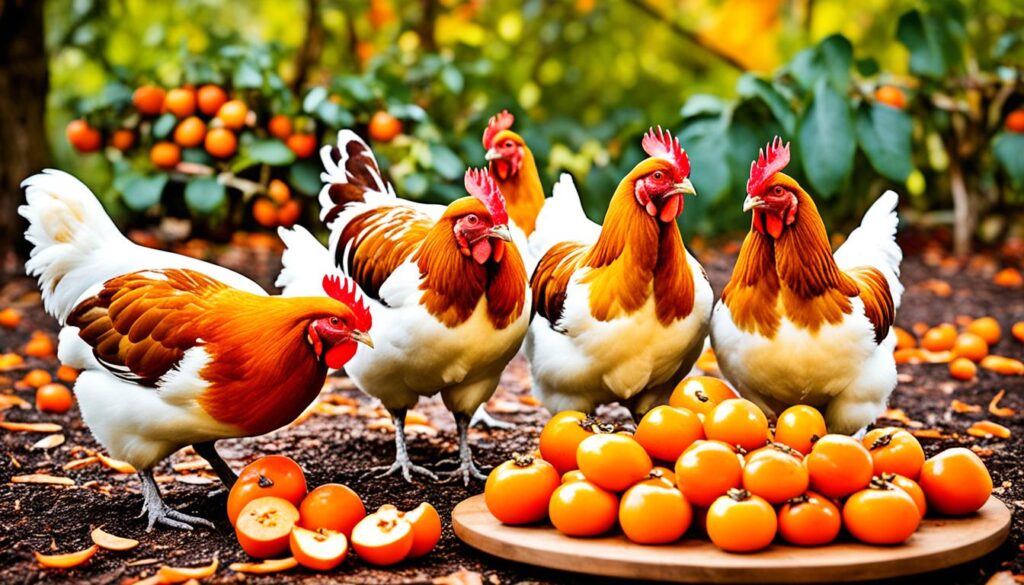
By including persimmons as part of a varied and balanced diet, chickens can enjoy the nutritional benefits of these vibrant fruits while leading healthy and active lives.
Feeding Persimmons to Chickens
To introduce persimmons to chickens, it’s important to start slowly and observe their reaction. Chickens may be hesitant to try new foods, so gradual introduction is key. One effective method is to hang a piece of persimmon in the chicken coop, allowing them to examine it before giving it a try. The soft skin and flesh of persimmons make them easy for chickens to consume, so there’s no need to cut them into small pieces or remove the skin.
Feeding Tips:
- Start by offering small pieces of persimmon.
- Observe the chickens’ reaction and appetite.
- Gradually increase the quantity of persimmons over time.
- Ensure persimmons are ripe and fresh for the best taste.
Once your chickens are accustomed to persimmons, you can make the feeding experience more enjoyable by cutting the fruit into different shapes or even hiding pieces for them to find. This adds a fun and stimulating element to their diet.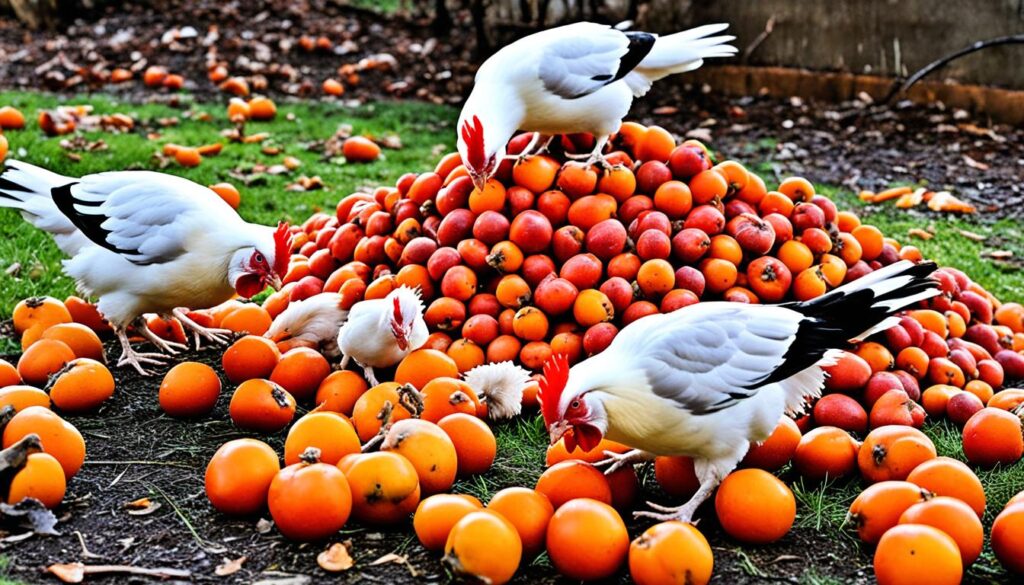
Remember, while persimmons are a healthy treat, they should be given in moderation to maintain a balanced diet for the chickens.
Potential Drawbacks of Persimmons for Chickens
While persimmons are generally safe for chickens to consume, there are a few potential drawbacks and risks associated with feeding persimmons to them. It’s essential for chicken owners to be aware of these considerations to ensure the well-being and health of their flock.
High Sugar Content: One concern when it comes to feeding persimmons to chickens is their high sugar content. Persimmons are naturally sweet fruits, and excessive consumption of high-sugar foods can lead to various health issues for chickens. It is crucial to moderate the quantity of persimmons and avoid feeding them in large quantities to prevent blood sugar imbalances and weight gain.
Health Conditions: Chickens with certain health conditions, such as diabetes or obesity, should be cautious when consuming persimmons. The high sugar content in persimmons can exacerbate these conditions and potentially lead to further health complications. It is advisable to consult with a veterinarian for specific dietary guidelines if your chickens have pre-existing health conditions.
Potential Intestinal Blockages: Another risk associated with persimmons for chickens is the presence of seeds. Persimmon seeds contain tannins, which can clump together and potentially lead to intestinal blockages if chickens consume them excessively. It’s crucial to monitor chickens’ intake and ensure that they don’t overindulge in persimmon seeds, reducing the risk of digestive problems and blockages.
Did You Know? Chickens have a gizzard, which helps them grind and digest their food. However, the seeds of fruits like persimmons can be challenging for a chicken’s digestive system to break down, increasing the risk of blockages.
| Drawbacks of Persimmons for Chickens | Risks of Feeding Persimmons to Chickens |
|---|---|
| High sugar content | Potential blood sugar imbalances |
| Health conditions (diabetes, obesity) | Potential exacerbation of existing health conditions |
| Presence of tannin in seeds | Potential intestinal blockages |
By being cautious and monitoring the quantity and frequency of persimmon feedings, chicken owners can minimize the drawbacks and risks associated with feeding persimmons to their flock. It is always recommended to provide a balanced and varied diet for chickens, consulting with a veterinarian if necessary, to ensure their overall health and well-being.
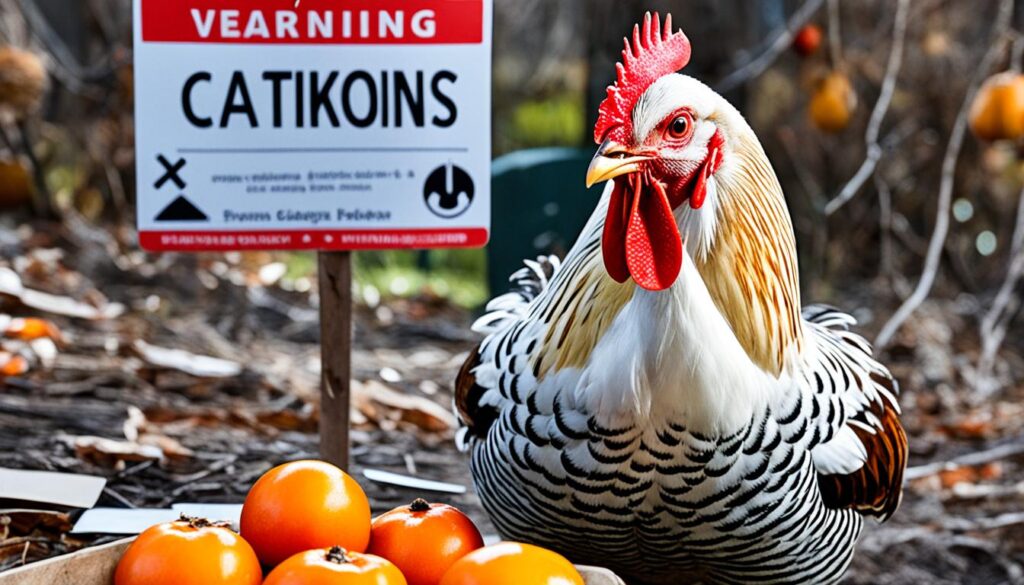
Feeding Persimmon Leaves to Chickens
Chickens can enjoy the benefits of persimmon leaves as part of their diet, but it’s important to offer them in moderation. Persimmon leaves provide fiber and other nutrients that can contribute to the overall digestion and well-being of your chickens.
Before giving persimmon leaves to your chickens, make sure to wash them thoroughly to remove any potential contaminants. Wilted or spoiled leaves should be avoided since they may contain toxins that could be harmful to your chickens.
When introducing persimmon leaves to your chickens for the first time, start with a small quantity and observe their reaction. Some chickens may have preferences, while others may take time to adjust to this new treat. Gradually increase the amount based on their response.
Feeding persimmon leaves to your chickens can be an excellent way to add variety to their diet, allowing them to enjoy the benefits of different nutrients. While persimmon leaves are generally safe for chickens, it’s always essential to monitor their diet and consult with a veterinarian for personalized advice.
Benefits of Persimmon Leaves for Chickens
Persimmon leaves offer several advantages for chickens. They are a rich source of fiber, which aids in digestion and promotes a healthy gut. Additionally, these leaves contain essential minerals and vitamins, such as potassium, manganese, and vitamin C, which contribute to the overall well-being and immune system of your chickens.
The fiber in persimmon leaves can help regulate bowel movements and prevent digestive issues in chickens. It assists in maintaining a healthy and balanced digestive system, allowing your chickens to better absorb nutrients from their food.
The table below highlights some of the key nutritional values of persimmon leaves:
| Nutrient | Amount per 100g |
|---|---|
| Fiber | 6g |
| Potassium | 214mg |
| Calcium | 81mg |
| Manganese | 1.5mg |
| Vitamin C | 43mg |
Remember, while persimmon leaves are beneficial for chickens, it’s important to offer them as part of a diverse diet that includes other healthy food options. Providing a balanced diet is key to maintaining the overall health and happiness of your flock.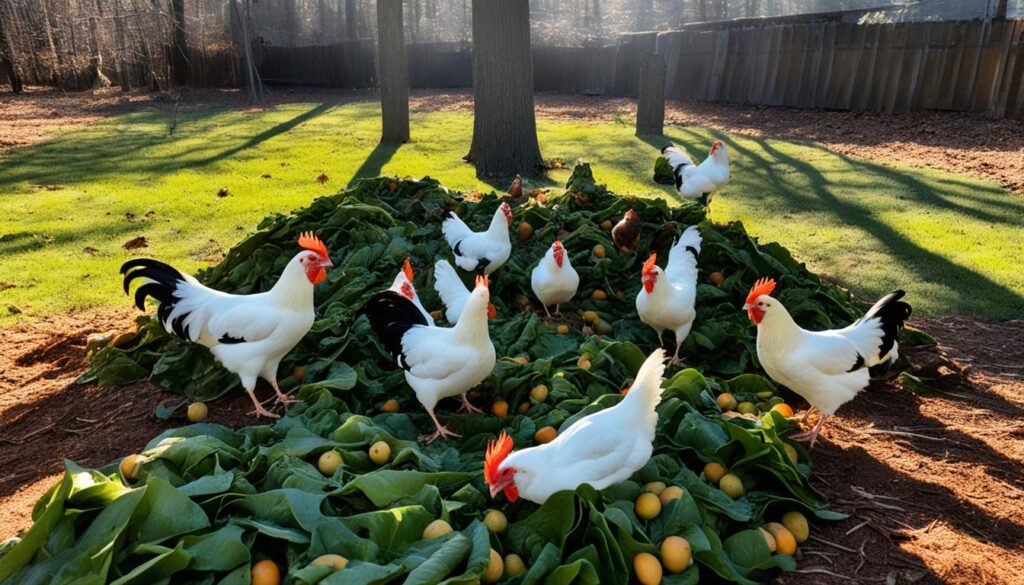
Remember to always introduce new foods gradually and keep a close eye on your chickens’ reaction. By offering persimmon leaves in moderation, you can provide your chickens with a nutritious and enjoyable addition to their diet.
Foods to Avoid Giving Chickens
While chickens can enjoy a variety of foods, it’s important to be aware of the foods that are toxic or harmful to them. By avoiding these foods, you can ensure the health and well-being of your chickens. Some of the foods that should be kept away from chickens include:
- Chocolate: Chocolate contains theobromine, which is toxic to chickens and can lead to symptoms like increased heart rate and tremors.
- Avocado: Avocado contains persin, a toxin that can be lethal to chickens if ingested in large quantities. It’s best to completely avoid feeding avocados to chickens.
- Lemons and oranges: Citrus fruits like lemons and oranges are highly acidic, which can upset the digestive system of chickens. While small amounts can be given as an occasional treat, it’s best to limit their intake.
- Processed foods: Foods that are high in salt, sugar, or artificial additives should be avoided. These can be harmful to chickens and can lead to various health issues.
Instead of these toxic or unhealthy foods, focus on offering safe and nutritious options for your chickens. Here are some examples:
- Vegetables: Leafy greens, carrots, peas, and cucumbers are all excellent choices for chickens. These vegetables provide essential vitamins and minerals.
- Fruits: Safe fruits for chickens include apples, berries, and watermelon. These fruits offer natural sweetness and hydration.
- Grains: Whole grains like oats and rice can be given to chickens in small amounts for added nutrition.
- Protein-rich options: Eggs or mealworms are great sources of protein for chickens. These can be offered as treats to supplement their diet.
By avoiding toxic foods and focusing on safe and nutritious options, you can ensure that your chickens stay healthy and happy.
| Toxic Foods for Chickens | Safe and Nutritious Alternatives |
|---|---|
| Chocolate | Vegetables: leafy greens, carrots, peas |
| Avocado | Fruits: apples, berries, watermelon |
| Lemons and oranges | Grains: oats, rice |
| Processed foods | Protein-rich options: eggs, mealworms |
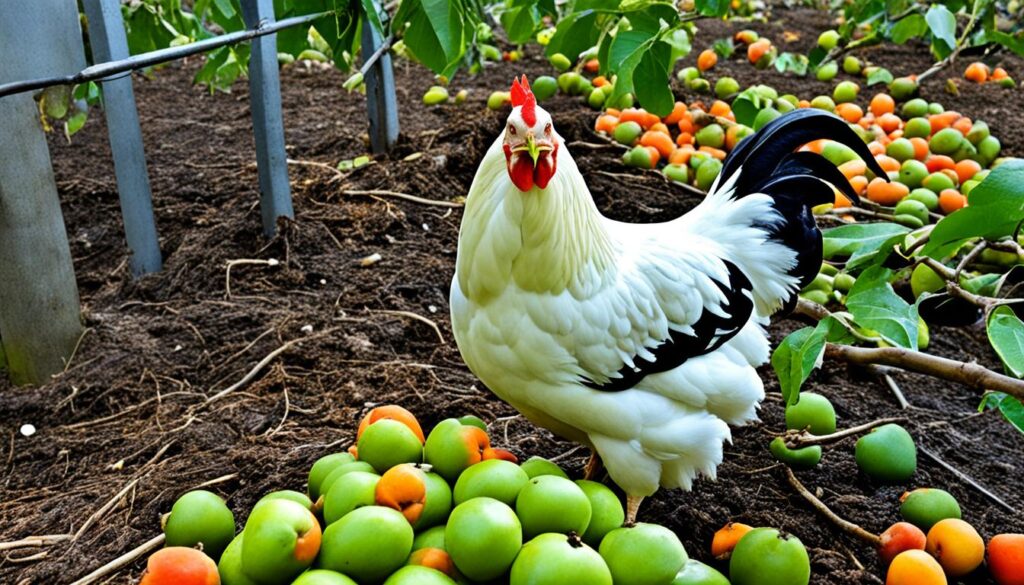
Can Chickens Eat Persimmons Skin?
Chickens can safely enjoy persimmon skins as part of their diet, as long as the skin is clean and free from pesticides. Persimmon skins contain additional nutrients and fiber, which can be beneficial to the chickens’ health. However, it’s important to offer the skin in moderation to avoid digestive issues, as it can be high in sugar. Introducing new foods gradually to chickens and monitoring their reactions is recommended to ensure their well-being. If any discomfort or digestive problems arise, it’s advisable to reduce or eliminate persimmon skin from their diet.
| Benefit | Description |
|---|---|
| Nutritional Value | Persimmon skins are rich in nutrients such as vitamins and fiber, which can contribute to the overall health of the chickens. |
| Moderation | Offering persimmon skins in moderation can help prevent excessive sugar intake and potential digestive issues. |
| Introduction | Gradually introducing new foods like persimmon skins allows for proper adjustment and observation of any adverse reactions. |
Feeding persimmon skins to chickens provides them with additional nutrients while enticing their taste buds. However, it’s essential to remember that persimmon skins should not replace their main diet, which should primarily consist of balanced commercial chicken feed.
List of Other Safe Fruits for Chickens
- Apples
- Bananas
- Berries
- Cantaloupe
- Grapes
- Kiwi
- Mango
- Peaches
- Pumpkins
- Watermelon
Remember to prioritize their regular feed and consult with a veterinarian for personalized advice.
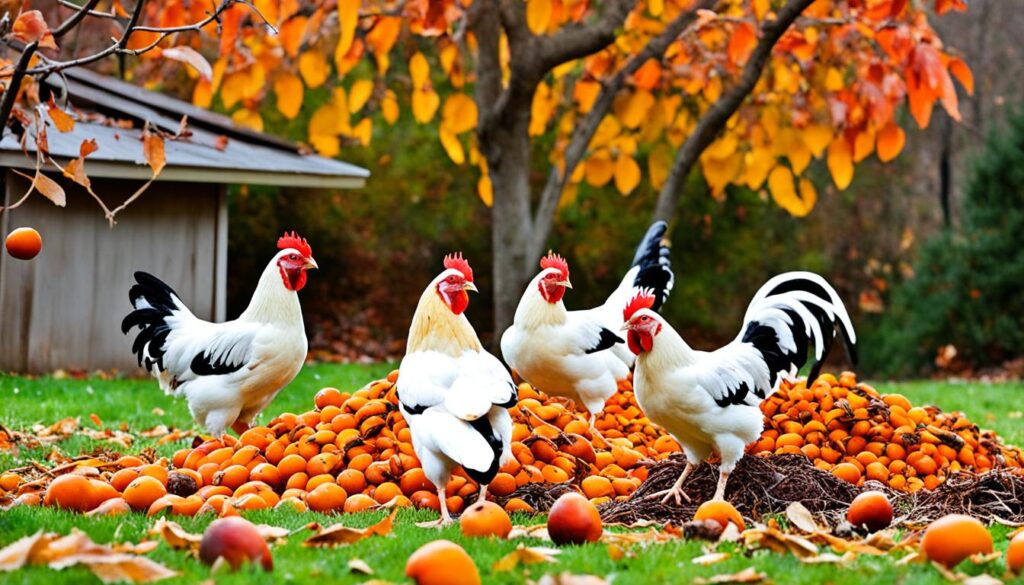
Including a variety of fruits in a chicken’s diet can provide essential vitamins, minerals, and hydration. However, it’s crucial to offer fruits as occasional treats rather than a substantial part of their daily nutrition. By maintaining a balanced and varied diet, chickens can enjoy persimmon skins and other safe fruits as part of a healthy lifestyle.
What Fruits Should I Give to My Chickens?
Chickens can enjoy a variety of fruits as occasional treats. Incorporating safe fruits into their diet provides essential vitamins, minerals, and hydration. However, it’s important to remember that fruits should only make up a small portion of their overall diet, with the main focus on a balanced commercial chicken feed.
Here are some safe fruits that you can give to your chickens:
- Apples
- Bananas
- Berries
- Cantaloupe
- Grapes
- Kiwi
- Mango
- Peaches
- Pumpkins
- Watermelon
These fruits not only provide a tasty treat but also offer a range of nutritional benefits. For example, bananas are a great source of potassium, while berries are packed with antioxidants. Watermelon and cantaloupe help keep chickens hydrated, especially during hot summer months.
It’s important to introduce these fruits in moderation to prevent overindulgence and ensure a balanced diet. Too much fruit can be disruptive to their digestive system or lead to obesity. Monitor their intake and observe any changes in behavior or health to ensure their well-being.
Benefits of Safe Fruits for Chickens
| Fruit | Nutritional Benefits |
|---|---|
| Apples | High in fiber and contain vitamins A, C, and E |
| Bananas | Rich in potassium and vitamin B6 |
| Berries | Packed with antioxidants and vitamin C |
| Cantaloupe | Hydrating and a good source of vitamins A and C |
| Grapes | Contain antioxidants and vitamins C and K |
| Kiwi | Rich in vitamin C, fiber, and folate |
| Mango | High in vitamins A and C |
| Peaches | Provide vitamins A and C |
| Pumpkins | Rich in beta-carotene and a good source of fiber |
| Watermelon | Hydrating and contains vitamins A and C |
Remember to always wash fruits thoroughly, remove any pits or seeds, and serve them in appropriate sizes for chickens. By offering a variety of safe fruits as occasional treats, you can keep your chickens happy, healthy, and entertained.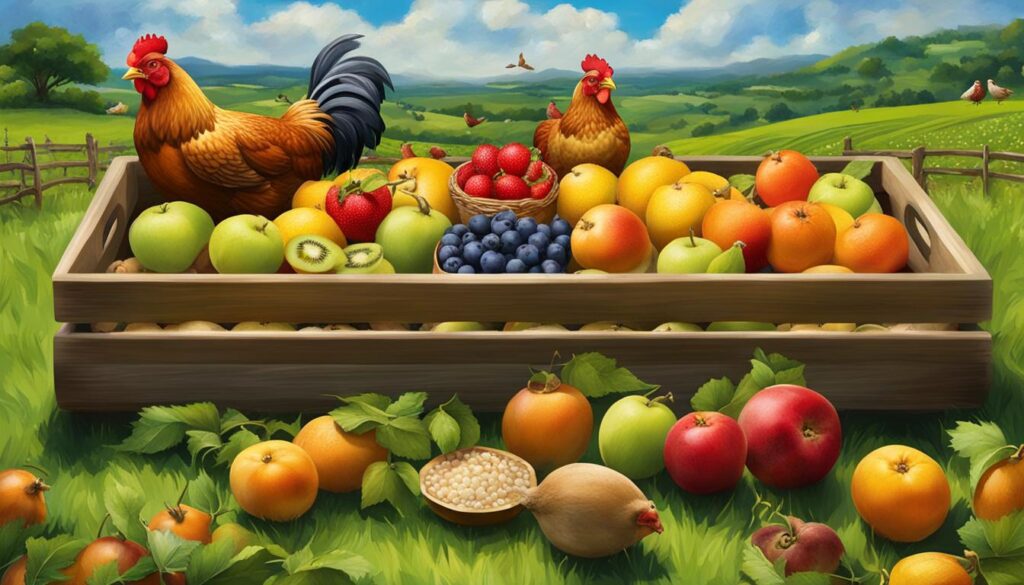
Conclusion
In conclusion, persimmons can be safely incorporated into a chicken’s diet as part of a balanced feeding routine. These delicious fruits offer a range of nutritional benefits, including essential vitamins and minerals that contribute to the overall well-being of chickens.
However, it’s important to feed persimmons to chickens in moderation. While persimmons are a natural source of sweetness, their high sugar content can cause issues if consumed excessively. Therefore, it’s crucial to monitor the quantity of persimmons and ensure they are not overindulging.
Additionally, it’s essential to consider potential drawbacks when feeding persimmons to chickens. Chickens with specific health conditions, such as diabetes or obesity, should have their persimmon intake limited. Moreover, care should be taken to prevent intestinal blockages that may occur if chickens consume an excessive amount of persimmon seeds.
To safely introduce persimmons into a chicken’s diet, it’s recommended to start gradually and observe their response. By offering a varied selection of treats alongside persimmons, chickens can enjoy a diverse diet while receiving the necessary nutrients. Prioritizing their regular feed is also vital to maintain a balanced nutritional intake.
FAQ
Can chickens eat persimmons?
Do persimmons provide any nutritional benefits to chickens?
How should I introduce persimmons to my chickens?
Are there any potential risks or drawbacks to feeding persimmons to chickens?
Can chickens eat persimmon leaves?
Are there any foods that I should avoid giving to chickens?
Can chickens eat persimmon skin?
What other fruits can I give to my chickens?
Is it safe to feed persimmons to chickens?
Paul’s love for animals knows no bounds. As a dedicated writer and animal lover, Paul brings a unique perspective to our team. His firsthand experiences with various animals enrich our content and provide valuable insights into their behavior and needs. Whether he’s sharing tips for pet care or shedding light on pressing conservation issues, Paul’s passion for animals shines through in everything he does.
Chickens
Can Chickens Eat Dragon Fruit? Safe Feeding Tips
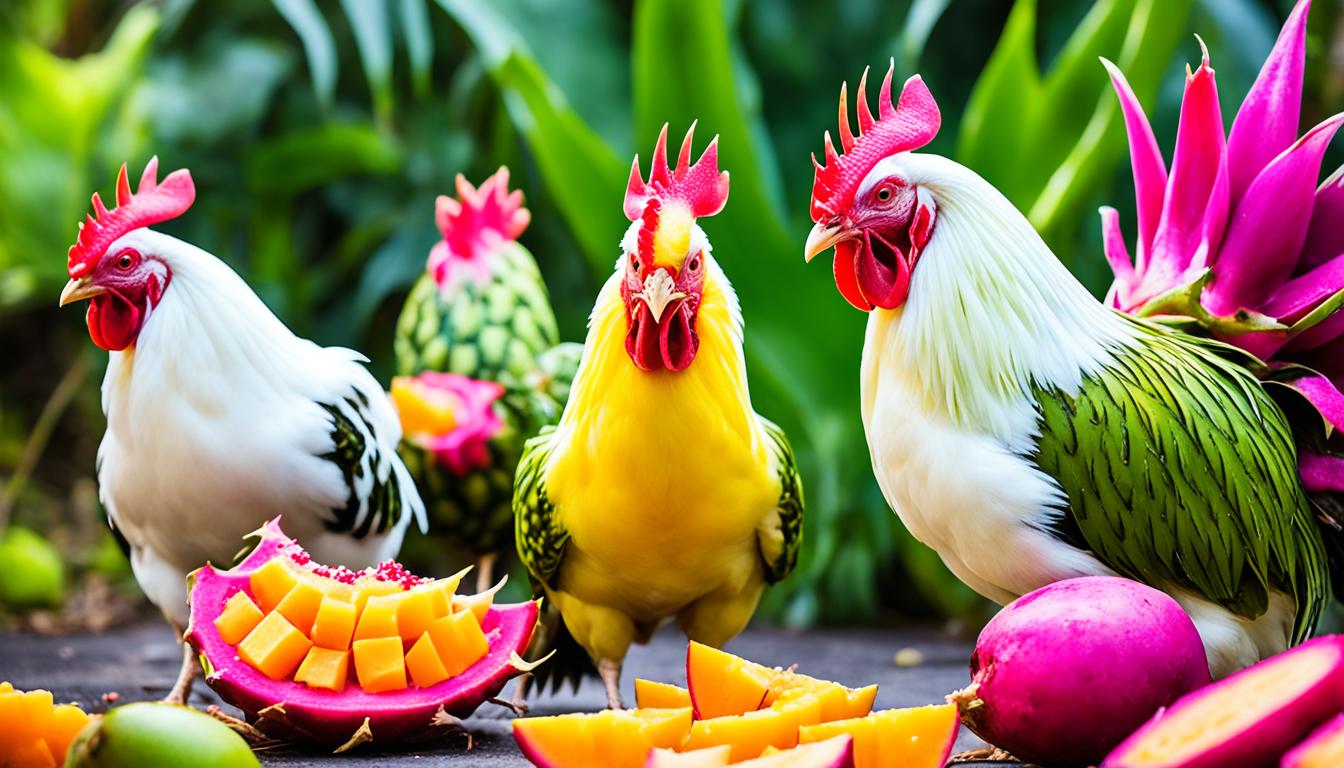
Did you know that chickens can safely enjoy the tropical delight of dragon fruit? This exotic fruit, with its vibrant colors and unique appearance, may seem like an unlikely choice for our feathered friends. However, dragon fruit can provide chickens with important nutrients while adding variety to their diet. In this article, we will explore the safety of feeding dragon fruit to chickens and provide you with valuable tips to ensure a safe and balanced treat for your flock.
Key Takeaways:
- Dragon fruit is safe for chickens and can provide them with essential nutrients.
- Remove the spiky skin and seeds before feeding dragon fruit to chickens.
- Feeding dragon fruit in moderation is important to prevent digestive issues.
- Monitor chickens for any adverse reactions when introducing new foods to their diet.
- Dragon fruit should be given as a treat, not the sole source of nutrition for chickens.
What is Dragon Fruit?
Dragon Fruit, also known as Pitahaya, is a tropical and exotic fruit that originates from Central and South America. Its vibrant pink or yellow skin encompasses a delicately flavored white or red flesh. Dragon fruit’s unique appearance and enticing aroma make it a popular ingredient in cuisines around the world.
What sets dragon fruit apart from other fruits is the fact that it grows on cacti and primarily blooms at night. This nocturnal flowering attracts pollinators such as bats and moths, making dragon fruit a fascinating botanical wonder.
Nutritional Value of Dragon Fruit for Chickens
Dragon fruit, with its vibrant colors and unique appearance, not only makes for an enticing treat for humans but also offers several nutritional benefits for chickens. This section will explore the nutritional value of dragon fruit for chickens and why it can be a healthy addition to their diet.
Dragon fruit contains essential nutrients that support healthy growth and development in chickens. Per 100 grams, dragon fruit provides:
| Nutrient | Amount per 100g |
|---|---|
| Calories | 60 |
| Protein | 1g |
| Fat | 0.4g |
| Carbohydrates | 13g |
Aside from these macronutrients, dragon fruit is a good source of essential vitamins and minerals. It contains vitamin C, which boosts the immune system and supports overall health. Additionally, it provides iron, which is essential for proper oxygen transport in the body, and magnesium, which plays a vital role in bone health and muscle function.
Feeding chickens small pieces of dragon fruit can ensure they benefit from these important nutrients. It’s important to note that while dragon fruit can be a nutritious addition to their diet, it should be given in moderation and as part of a balanced feeding plan. As with any food, too much of a good thing can be detrimental. 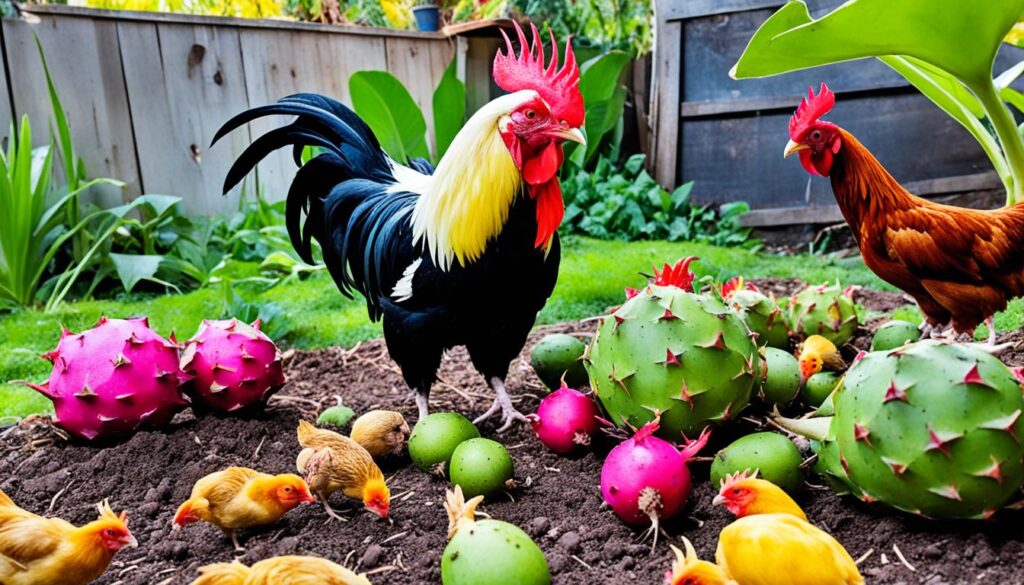
Keep in mind their overall nutritional requirements and consider the serving size and frequency of providing dragon fruit to ensure a well-rounded diet for your chickens.
Health Benefits of Dragon Fruit for Chickens
Dragon fruit is not only a delicious treat for humans but also offers numerous health benefits for chickens. Feeding your chickens dragon fruit can provide them with essential nutrients and promote their overall well-being. Here are some of the key health benefits that dragon fruit offers to chickens:
- Boosts Immunity: Dragon fruit contains high levels of vitamin C, which can strengthen the immune system of chickens, helping them fight off diseases and infections.
- Reduces Inflammation: The antioxidants present in dragon fruit help reduce inflammation in chickens, promoting healthier body functions and reducing the risk of chronic inflammation-related diseases.
- Aids Digestion: The fiber content in dragon fruit can improve digestion in chickens, preventing digestive issues such as constipation and bloating.
- Enhances Heart Function and Controls Blood Pressure: Dragon fruit contains beneficial compounds that can promote heart health in chickens by enhancing cardiovascular function and keeping blood pressure levels in check.
- Promotes Healthy Skin, Feathers, and Nails: The vitamins and minerals present in dragon fruit contribute to healthy skin and feathers, keeping chickens looking vibrant and ensuring strong nail growth.
- Reduces the Risk of Illnesses and Diseases: The antioxidants and phytochemicals in dragon fruit can help protect chickens from various illnesses and diseases, including certain types of cancers.
Feeding dragon fruit to chickens not only provides these health benefits but can also increase egg-laying productivity and minimize mortality rates among chicks. It is a nutritious and enjoyable addition to their diet.
“Dragon fruit offers a range of health benefits for chickens, including improved immunity, reduced inflammation, enhanced digestion, heart health, and protection against illnesses and diseases.”
Now that you know about the health benefits, let’s dive into the risks associated with feeding dragon fruit to chickens and the precautions you should take to ensure their safety.
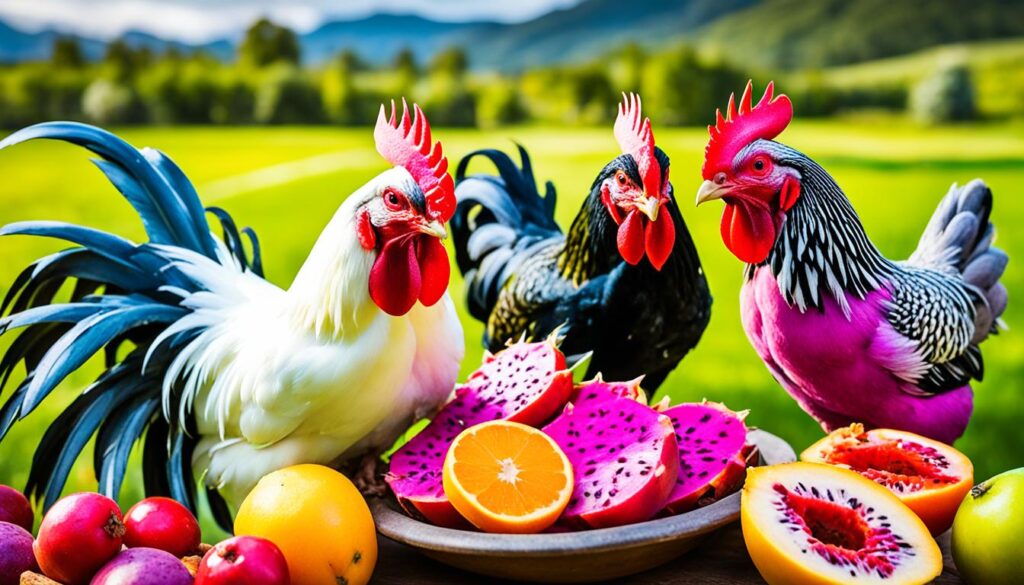
Risks of Feeding Dragon Fruit to Chickens
While dragon fruit is generally safe for chickens, it’s important to be aware of the potential risks associated with feeding it to them. Taking precautionary measures and monitoring their reactions can help ensure their well-being.
1. Digestive Issues
Feeding chickens excessive amounts of dragon fruit can lead to digestive problems such as diarrhea, bloating, and gas. This is primarily because dragon fruit is high in fiber. It’s essential to provide the fruit in moderation to avoid any discomfort or disruptions in their digestive system.
2. Allergic Reactions
Chickens may develop allergies to certain components present in dragon fruit. As a result, they may experience symptoms like itching, rash, swelling, respiratory distress, or gastrointestinal disorders. If any of these signs are observed after feeding them dragon fruit, it’s advisable to consult a veterinarian for further evaluation and guidance.
3. Moderation and Monitoring
To mitigate the risks associated with feeding dragon fruit to chickens, it’s crucial to practice moderation. Offering small portions of dragon fruit as an occasional treat or supplement to their regular diet can help maintain balance. Additionally, closely monitoring the chickens for any adverse reactions can enable prompt intervention and adjustment of feeding practices if necessary.
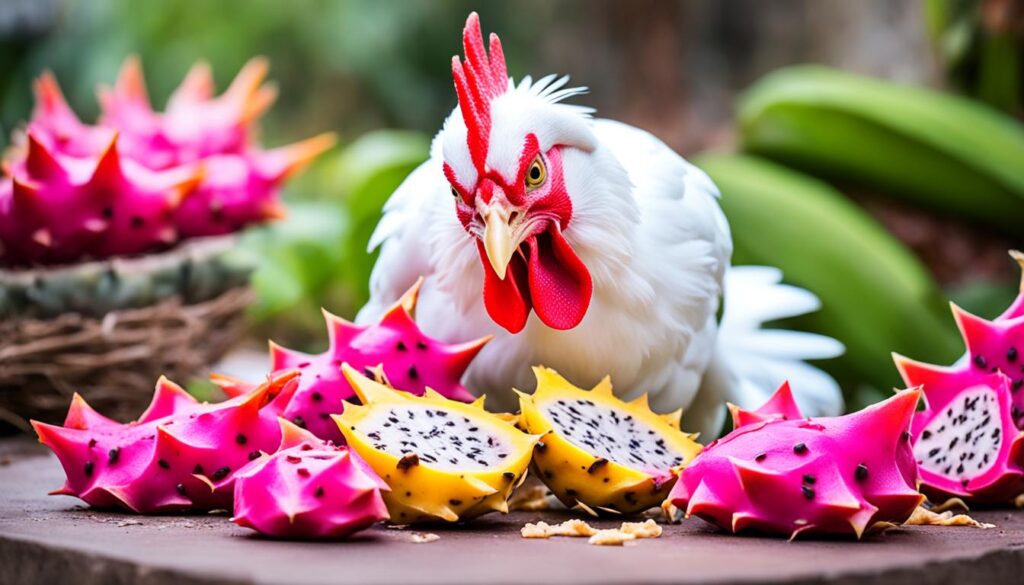
“Feeding chickens excessive amounts of dragon fruit can lead to digestive problems such as diarrhea, bloating, and gas.”
| Risks of Feeding Dragon Fruit to Chickens | Precautionary Measures |
|---|---|
| Digestive Issues | Feed in moderation to avoid discomfort and digestive disruptions. |
| Allergic Reactions | Watch for symptoms, and consult a veterinarian if necessary. |
| Moderation and Monitoring | Offer small portions and closely observe chickens’ reactions. |
Precautions to Take
Feeding dragon fruit to chickens can be a healthy and enjoyable addition to their diet. However, there are some precautions to take to ensure their safety and well-being. By following these simple guidelines, you can protect your chickens from any potential hazards associated with dragon fruit.
Washing the Fruit
Before feeding dragon fruit to your chickens, it’s important to wash the fruit thoroughly with clean water. This helps remove any pesticides or contaminants that may be present on the skin. By washing the fruit, you can ensure that your chickens consume only the beneficial nutrients without any harmful substances.
Cutting into Small Pieces
Dragon fruit should be cut into small, bite-sized pieces before feeding it to chickens. This not only makes it easier for them to eat but also eliminates the risk of choking hazards. By cutting the fruit into smaller pieces, you can ensure that your chickens can consume it safely without any discomfort.
Removing the Skin and Seeds
When preparing dragon fruit for chickens, it’s essential to remove the skin and seeds. The skin can be tough and difficult for chickens to digest, while the seeds can pose a choking hazard. By removing these parts, you eliminate any potential digestive issues or risks to your chickens’ health.
Introducing Gradually and Monitoring
When introducing dragon fruit to your chickens’ diet, it’s best to do so gradually. Start by offering small amounts and observe how they respond. Monitor your chickens for any adverse reactions such as diarrhea or vomiting. If any unusual symptoms occur, discontinue feeding dragon fruit and consult a veterinarian.
Tip: It’s important to remember that chickens have different dietary preferences and tolerances. While most chickens can enjoy dragon fruit without any issues, some may have individual sensitivities or allergies. Always be cautious when introducing new foods and closely observe your chickens’ reactions.
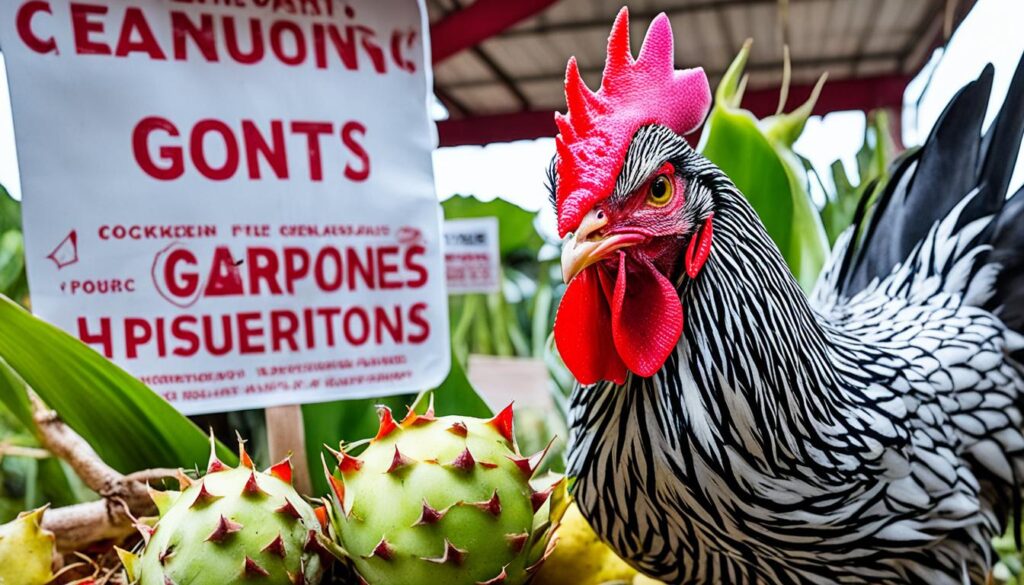
Incorporating dragon fruit into your chickens’ diet can be a beneficial and enjoyable experience. By taking these precautions and ensuring their safety, you can provide your chickens with a nutritious treat that supports their overall health and well-being. Remember to prioritize moderation and monitor your chickens closely for any signs of discomfort or adverse reactions. With proper care, feeding dragon fruit to your chickens can be a rewarding and enriching part of their diet.
Serving Size and Frequency
When it comes to feeding dragon fruit to chickens, serving size and frequency are key considerations. It’s important to offer the right amount of this delicious treat to avoid any digestive issues and keep your chickens healthy. Monitoring their response and adjusting the serving size and frequency accordingly is essential. Here are some guidelines to help you determine the appropriate serving size and frequency for feeding dragon fruit to chickens:
Serving Size:
- Offer quarter-sized pieces of dragon fruit to chickens on a weekly basis.
- Provide half-sized pieces of dragon fruit every two weeks.
- Give a whole piece of dragon fruit as a special treat once a month.
Remember, while dragon fruit is nutritious for chickens, it should be given in moderation. It’s best to offer it as a treat rather than a major part of their diet. This will help prevent any potential digestive issues, as dragon fruit has high water and sugar content.
Frequency:
Dragon fruit should be fed to chickens a couple of times per week. To ensure a balanced diet, it’s important to rotate the fruit with other treats and make it a part of their overall feeding schedule.
However, keep in mind that the size of your flock will determine the quantity of dragon fruit to offer at each feeding. As a general guide, 2-3 dragon fruits can be given to chickens, depending on their size and appetite.
Always remember that dragon fruit should be considered a supplemental treat and not the sole source of nutrition for your chickens. Variety is key when it comes to their diet, so be sure to incorporate other fruits, vegetables, and grains to provide a well-rounded and nutritious meal plan.
By following these serving size and frequency guidelines, you can ensure that your chickens enjoy the benefits of dragon fruit while maintaining a healthy balance in their diet.
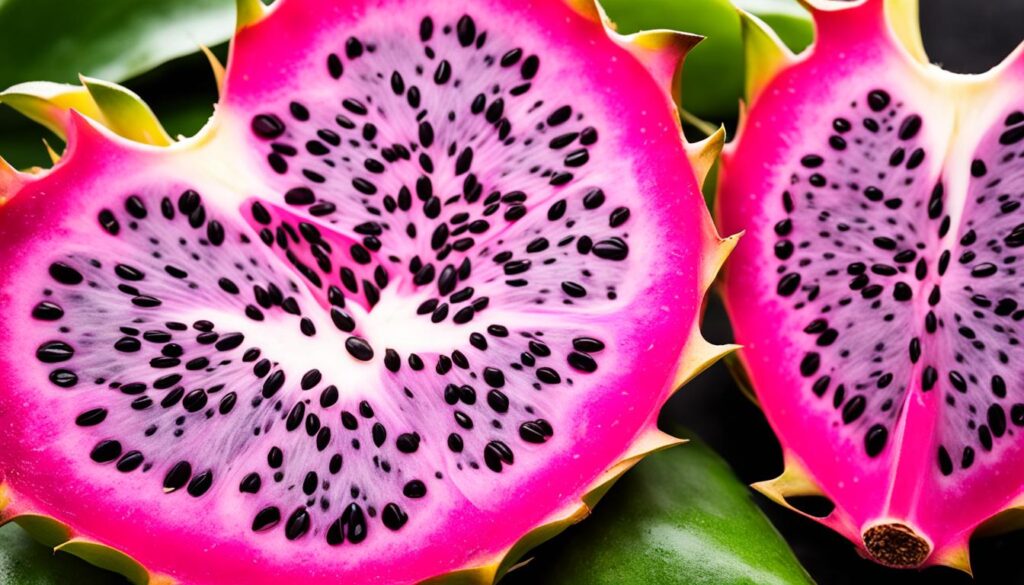
Risks and Benefits of Feeding Dragon Fruit Skin to Chickens
Dragon fruit skin can be safely consumed by chickens, although it may require cutting into smaller pieces due to its toughness. The skin of dragon fruit is packed with nutrients that can provide various benefits to chickens. These include antioxidants, pectins, betacyanin, vitamins, and dietary fiber. These nutrients contribute to the overall health and well-being of the chickens.
However, it’s crucial to ensure that the dragon fruits chosen for feeding the chickens have been organically grown. This precaution helps avoid potential chemical residues that may be present in conventionally grown fruits. By opting for organic dragon fruits, the risks associated with harmful chemicals can be minimized, safeguarding the well-being of the chickens.
While dragon fruit skin offers nutritional benefits, it’s essential to feed it in moderation to prevent any potential toxic effects resulting from chemicals or excessive consumption. Maintaining a balanced and varied diet for chickens is crucial, incorporating a range of nutritious treats, including dragon fruit skin, to promote overall health.
Benefits of Feeding Dragon Fruit Skin to Chickens:
- Provides essential nutrients like antioxidants, pectins, betacyanin, vitamins, and dietary fiber
- Supports overall health and well-being of chickens
- Contributes to a nutritious and balanced diet for chickens
Risks of Feeding Dragon Fruit Skin to Chickens:
- Potential exposure to chemical residues if not organically grown
- Possible toxic effects from excessive consumption
Overall, feeding dragon fruit skin to chickens can be beneficial, but it’s vital to exercise caution and moderation to ensure the well-being and safety of the flock.
| Benefits | Risks |
|---|---|
| Provides essential nutrients | Potential exposure to chemical residues |
| Supports overall health | Possible toxic effects from excessive consumption |
| Contributes to a balanced diet |
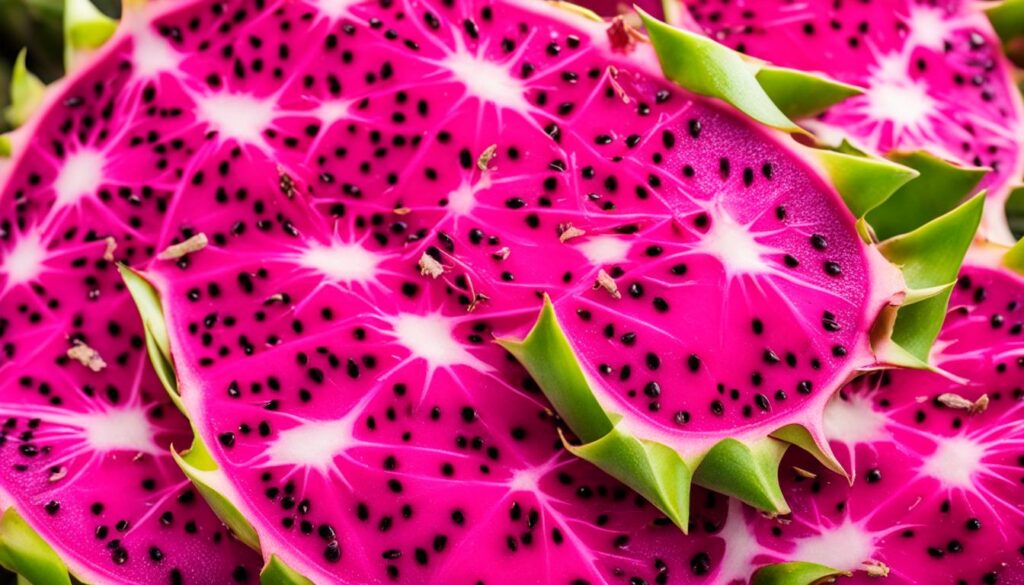
How to Feed Dragon Fruit to Chickens
When it comes to feeding dragon fruit to chickens, there are various methods you can use to ensure they enjoy this tropical treat. Here are a few suggestions:
- Halves on the Ground: Cut the dragon fruit into halves and lay them on the ground for the chickens to explore. The vibrant color and unique texture will pique their curiosity, and they will peck at it to enjoy the juicy flesh.
- Hanging From a Branch: For a fun feeding experience, you can hang the dragon fruit from a branch in the chicken coop or run. This lets the chickens jump or fly up to reach the fruit, engaging their natural instincts and providing entertainment while they enjoy their treat.
- Slices in Feeders: Another option is to slice the dragon fruit and place the pieces in their feeders. This ensures the fruit stays clean and prevents dirt from getting on it. Mixing it with other fruits and vegetables can create a delightful surprise in their feeders, encouraging them to explore and experiment with different flavors.
Remember, introducing dragon fruit to chickens should be an enjoyable experience that promotes their well-being and provides a nutritious addition to their diet. Be creative and find the feeding method that works best for your flock!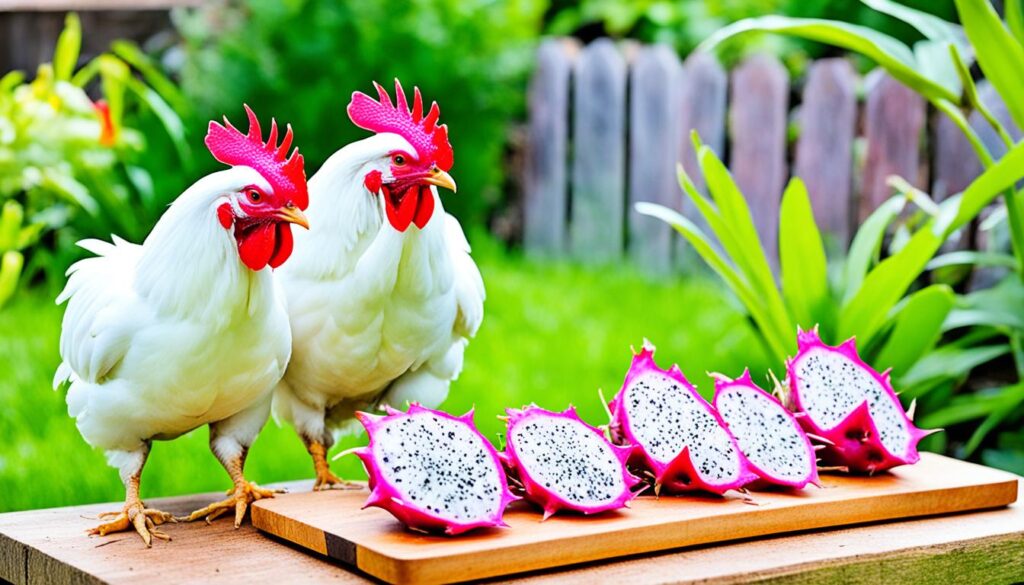
How Much and How Often to Feed Dragon Fruit to Chickens
Feeding dragon fruit to chickens requires moderation to ensure their optimal health and well-being. Due to its high water and sugar content, it is important to offer dragon fruit as a treat rather than a staple. Providing it a couple of times per week is sufficient, allowing for a balanced and varied diet.
It is recommended to rotate dragon fruit with other treats to ensure chickens receive a diverse range of nutrients. This can include a mix of fruits, vegetables, and grains to meet their dietary needs. By offering a variety of treats, you can provide a well-rounded nutritional profile for your flock.
Depending on the size of your flock, you can provide 2-3 dragon fruits per feeding. Keeping in mind that chickens have different preferences, observe their response to the fruit and adjust the serving size accordingly. Always remember that moderation is key to avoid potential digestive issues.
While dragon fruit is a nutritious addition to a chicken’s diet, it should not be the sole source of nutrition. It is essential to ensure they have access to a complete and balanced feed specifically formulated for their needs. Supplements and treats like dragon fruit should complement their diet, enhancing their overall health and satisfaction.
Feeding Guide:
- Feed dragon fruit to chickens a couple of times per week.
- Rotate dragon fruit with other treats to provide variety.
- Offer 2-3 dragon fruits per feeding, adjusting serving size based on flock size.
- Ensure chickens have access to a complete and balanced feed as their main source of nutrition.
By following these guidelines, you can provide your chickens with the benefits of dragon fruit while maintaining their overall well-being. Remember to monitor their response and consult a veterinarian if you have any concerns. Happy chickens enjoy a diverse and nutritious diet!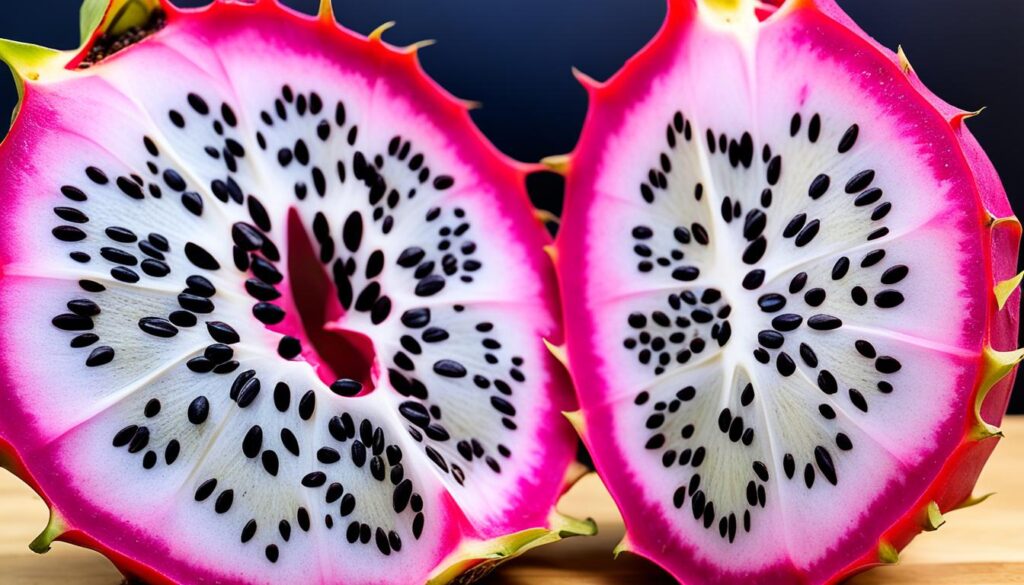
Conclusion
In conclusion, chickens can safely enjoy the delicious and nutritious treat of dragon fruit. This tropical fruit is packed with vitamins, minerals, and antioxidants that support their overall health. However, it’s crucial to remember a few important feeding tips to ensure their safety.
Firstly, it’s essential to remove the skin and seeds of the dragon fruit before feeding it to chickens. Although the flesh is safe for consumption, the spiky skin and hard seeds can pose choking hazards and digestive issues.
Secondly, moderation is key. While dragon fruit provides valuable nutrients, feeding it in excess can lead to digestive problems such as diarrhea, bloating, and gas. It’s crucial to offer dragon fruit as a treat in conjunction with a balanced diet to avoid any adverse effects.
Lastly, closely monitor your chickens for any adverse reactions to dragon fruit. Every chicken’s digestive system is unique, and some may have allergies or sensitivities to certain foods. If you notice any abnormal behavior or health concerns, consult a veterinarian for proper guidance.
By following these safe feeding tips, you can confidently introduce dragon fruit as a healthy addition to your chickens’ diet. They’ll enjoy the flavorful treat while reaping the nutritional benefits it provides. Remember to prioritize their well-being and make informed decisions about their dietary choices.FAQ
Can chickens eat dragon fruit?
What is dragon fruit?
What is the nutritional value of dragon fruit for chickens?
What are the health benefits of dragon fruit for chickens?
What are the risks of feeding dragon fruit to chickens?
What precautions should I take when feeding dragon fruit to chickens?
What is the serving size and frequency of feeding dragon fruit to chickens?
What are the risks and benefits of feeding dragon fruit skin to chickens?
How can I feed dragon fruit to chickens?
How much and how often should I feed dragon fruit to chickens?
Can chickens eat dragon fruit? Safe Feeding Tips
Paul’s love for animals knows no bounds. As a dedicated writer and animal lover, Paul brings a unique perspective to our team. His firsthand experiences with various animals enrich our content and provide valuable insights into their behavior and needs. Whether he’s sharing tips for pet care or shedding light on pressing conservation issues, Paul’s passion for animals shines through in everything he does.
Chickens
Identify Weasel Predation: Did It Kill Your Chicken?
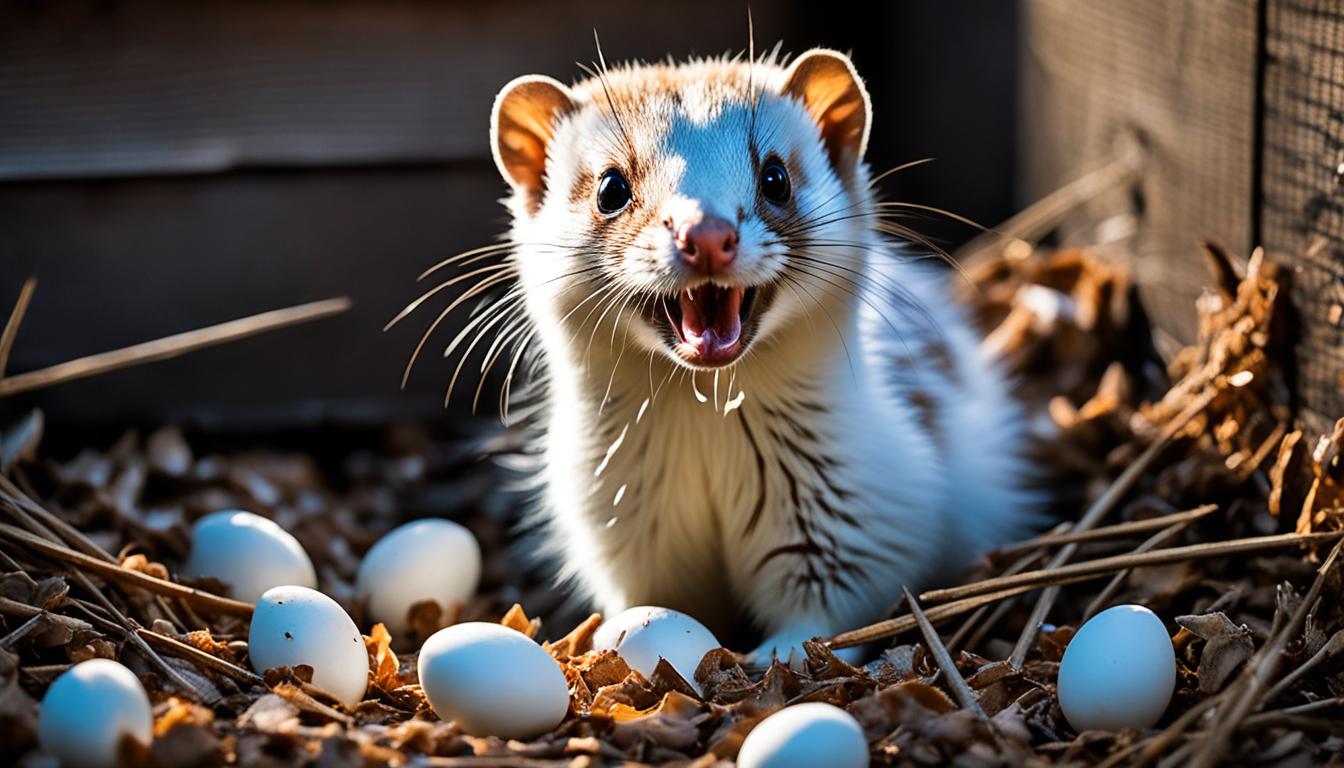
Did you know that weasel predation is responsible for the loss of thousands of chickens every year in the United States? These small but ruthless predators can decimate flocks, leaving behind a gory mess of feathers and carcasses. It’s crucial to be able to identify the signs of a weasel attack to protect your chickens and prevent future losses.
Key Takeaways
- Weasels are a less common but dangerous predator that targets chickens.
- Signs of a weasel attack include ripped-off heads, pulled-out intestines, and an acrid odor.
- Weasels can fit through small openings in coops and are relentless in their pursuit of chickens.
- Preventing weasel attacks requires securing coop walls and repairing any holes in the wire.
- Trapping weasels can be an effective method, but they may return to their home territory after relocation.
Understanding Weasels as Chicken Killers
Weasels are notorious predators that pose a significant threat to chickens. These small and agile creatures are known for their ruthless behavior, often attacking in family groups. They kill not only for survival but also for sport, leaving behind a gruesome sight of feathers, blood, and carcasses.
One distinctive characteristic of weasels is their unmistakable odor. This odor can serve as a telltale sign of their presence near chicken coops. Weasels are also skilled at maneuvering through small openings, making it essential for chicken owners to implement effective preventive measures.
To gain a better understanding of weasels and their attacks on chickens, let’s explore their behavior in more detail:
- Group Attacks: Weasels are social predators and often coordinate attacks, increasing the harm they inflict on chickens.
- Nocturnal Predation: These creatures are primarily active during the night, catching their prey off guard.
- Opportunistic Hunters: Weasels take advantage of any opportunity to strike, targeting chickens when other food sources are scarce.
- Swift and Precise Attacks: Weasels have sharp teeth and are known for their calculated bites on the back of a chicken’s neck, resulting in swift kills.
It is important to recognize these behavioral patterns to effectively protect chickens from weasel attacks. The next section will discuss practical strategies to prevent weasel entry into chicken coops and ensure the safety of your flock.
Preventing Weasel Attacks on Chickens
When it comes to protecting your chickens from weasel attacks, preventive measures are key. Weasels have the ability to dig under coop walls or squeeze through small holes to reach their prey. Fortunately, there are several steps you can take to secure your chicken coop and prevent weasel entry.
Securing the Chicken Coop
One effective method for preventing weasel attacks is to bury or reinforce the walls of the coop. By burying the walls underground or reinforcing them with wire mesh, you can create a barrier that weasels are less likely to penetrate. Additionally, installing sturdy wire fences with small holes around the perimeter of the coop can further deter weasels and other similar predators.
Maintaining the Coop
Regular maintenance of the coop is essential to prevent weasel entry. It’s important to promptly repair any holes or gaps in the coop wires using hardware cloth or a similar material. Weasels can exploit even the smallest openings, so it’s crucial to address any potential entry points as soon as they are discovered.
Consider Trapping
Trapping can be an alternative option for dealing with weasels, but it’s important to note that these predators are territorial creatures. Therefore, even if you successfully trap and relocate a weasel, there is a high likelihood that it will return to its original territory. Trapping should be used as a temporary solution while focusing on reinforcing the coop and implementing preventive measures.
By following these preventive steps, you can significantly reduce the risk of weasel attacks on your chickens. Remember, securing the chicken coop from weasels is crucial for the safety and well-being of your poultry.
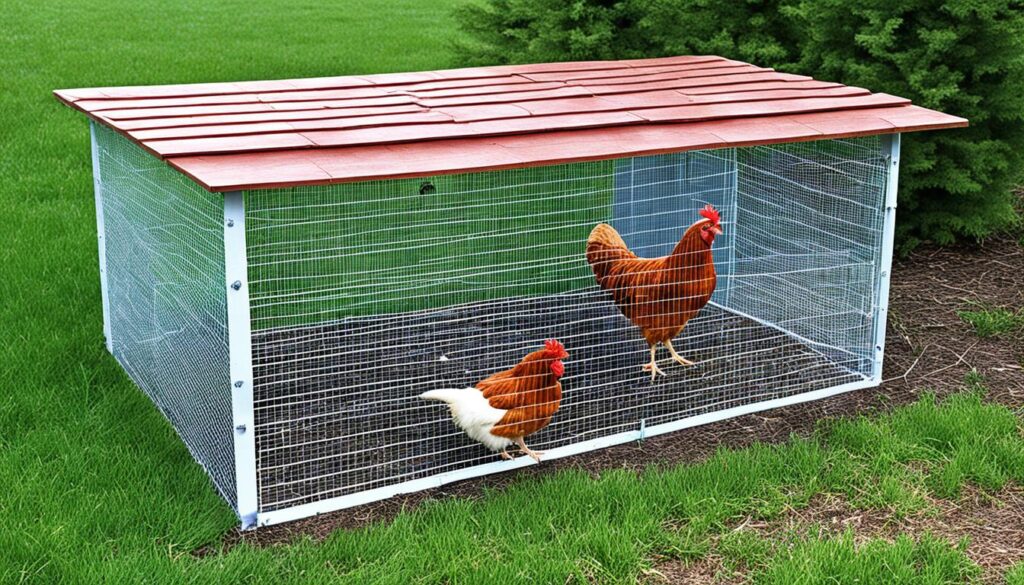
Continue reading to learn more about weasels and their behavior in Section 4.
Weasels and Their Behavior
In North America, weasels are part of the larger mustelid family. Among the various species, the long-tailed weasel is the most widely distributed and prevalent in the United States. These small creatures have a light brown fur with a white belly, accompanied by a distinctive black-tipped tail that sets them apart.
Primarily nocturnal and solitary, weasels are skilled hunters that inhabit dens under rocks or logs. Their adaptability allows them to thrive in various environments, including forests, grasslands, and farmlands.
Female weasels typically have one litter per year, consisting of several kits. These kits remain under the care of their mother until they are old enough to venture out on their own. Being natural hunters, weasels can pose a threat to small animals, including chickens.
Let’s take a closer look at the range of weasels in North America:
Weasel Species in North America
There are several species of weasels found in North America, each with unique characteristics and geographical range:
| Weasel Species | Common Name | Geographical Range |
|---|---|---|
| Mustela frenata | Long-tailed Weasel | Throughout North America |
| Mustela vison | American Mink | Most of North America |
| Mustela erminea | Short-tailed Weasel (Ermine) | Across the United States and Canada |
| Mustela nivalis | Least Weasel | Found in northern regions of North America |
| Neogale vison | Black-footed Ferret | Restricted to specific regions in North America |
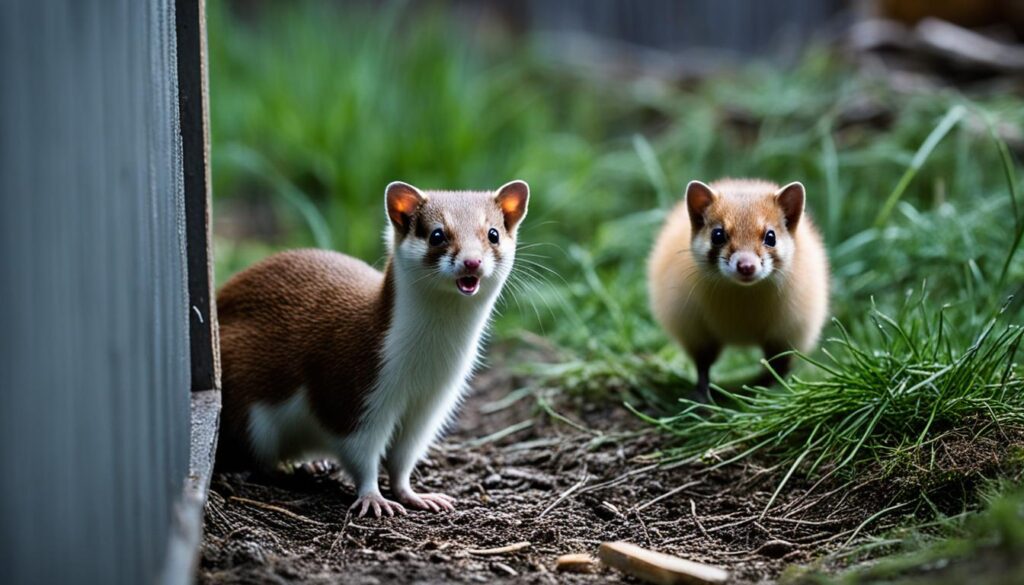
In their natural habitat, weasels play a vital role in the ecosystem by controlling populations of rodents, birds, fish, frogs, and eggs. However, when weasels come into contact with backyard chicken coops or farms, they can become poultry predators, causing significant losses.
Being aware of weasels’ behavior and their range in North America is crucial for chicken owners, enabling them to take preventive measures to protect their flocks from potential attacks.
The Role of Weasels in Nature
Weasels play a vital role in the ecosystem, contributing to the delicate balance of nature. While they may sometimes cause concern for chicken owners, it’s important to recognize their positive impact on pest control and the overall health of the environment.
One of the significant contributions of weasels is their ability to control populations of rodents, fish, birds, frogs, and eggs. They are skilled hunters and play a crucial role in keeping these populations in check. By reducing the numbers of these prey species, weasels help maintain a healthy balance in the ecosystem.
Furthermore, weasels indirectly benefit chickens by redirecting other predators to alternative food sources. Chickens are vulnerable to attacks from various predators, but the presence of weasels can deter these predators from targeting chickens directly. Weasels act as competitors and competitors restraints for other predators, ultimately benefitting the well-being of chickens.
Weasels also contribute to the food chain as prey for larger animals. They are hunted by animals such as hawks, owls, foxes, and coyotes. By providing a food source for these larger predators, weasels contribute to sustaining the populations of these species and maintaining the complex web of life in the natural environment.
However, it’s essential to understand that weasels’ hunting instincts are triggered by movement. This makes chickens vulnerable targets when other food sources are scarce. While it may seem inconvenient for chicken owners, it highlights the adaptability and resourcefulness of weasels in finding food to survive.
In conclusion, weasels have a significant impact on the ecosystem by controlling populations of pests and serving as prey for larger animals. Understanding their role in nature can help us appreciate their place in the overall ecological balance. Although they may pose challenges for chicken owners, implementing preventive measures can help protect chickens while allowing weasels to fulfill their essential ecological roles.
Weasels’ Impact on the Ecosystem
| Beneficial Impact | Challenges |
|---|---|
| Weasel predation controls populations of rodents, fish, birds, frogs, and eggs. | Weasels may target chickens and cause losses in backyard coops. |
| Weasels redirect other predators to alternative food sources, indirectly benefiting chickens. | Weasel attacks on chickens can be distressing for chicken owners. |
| Weasels contribute to the food chain as prey for larger animals like hawks, owls, foxes, and coyotes. | Weasels’ hunting instincts make chickens vulnerable when other food sources are scarce. |
Why Weasels Target Chickens
Weasels are known for their predatory behavior towards chickens, but have you ever wondered why they specifically target these birds? Understanding the reasons behind weasel predation behavior can help chicken owners better protect their flock.
When prey is scarce or when weasels have young to feed, they instinctively target chickens as a source of food. Chickens are often kept in coops or enclosures, making them an easily accessible and vulnerable target for these opportunistic predators.
The movement of chickens triggers the hunting instinct in weasels, leading them to continue killing until they perceive there are no more prey left. This behavior can result in multiple chickens being attacked and killed in one instance.
“Weasels have a signature method of killing by biting the back of the neck, which can lead to the myth of blood-sucking. Their intention is not to drink blood, but rather to immobilize their prey quickly and efficiently.”
It’s important to note that weasels may hide the extra bodies for future consumption, which can make it difficult for chicken owners to determine the extent of predation. This behavior is part of their natural instinct to store food for times when prey is scarce.
By identifying the reasons why weasels target chickens, chicken owners can take proactive measures to safeguard their flock and minimize predation risks.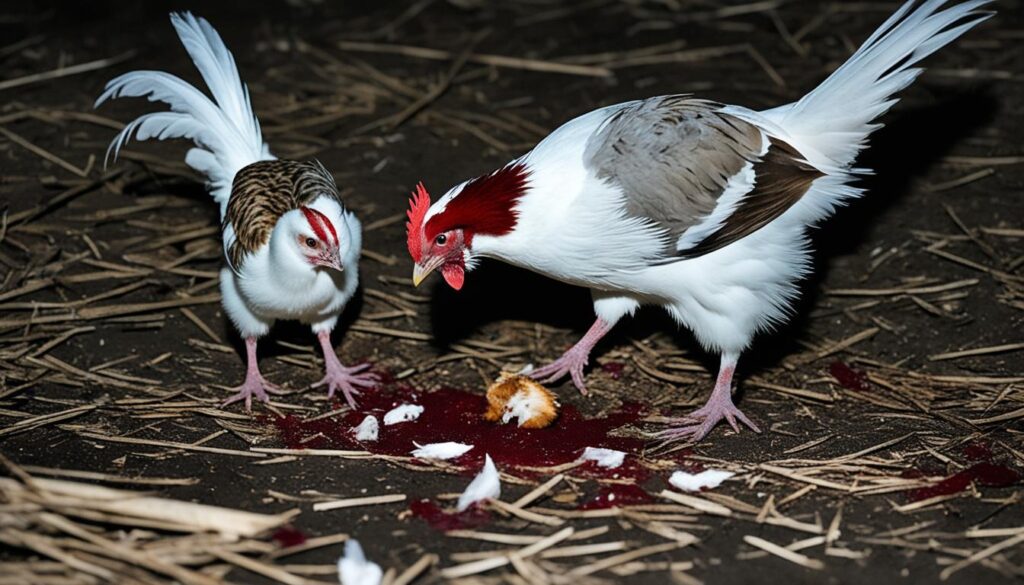
Weasel Predation Behavior Comparison
| Predatory Behavior | Weasels | Other Predators |
|---|---|---|
| Target Prey | Chickens predominantly | Varies (rodents, birds, etc.) |
| Killing Method | Biting the back of the neck | Varies (strangulation, crushing, etc.) |
| Action After Kill | Hiding extra bodies for future consumption | Varies (immediate consumption or caching) |
Precautions to Prevent Weasel Attacks on Chickens
When it comes to protecting your chickens from weasel attacks, taking proper precautions is essential. By securing your chicken coop and implementing preventive measures, you can create a safe environment for your flock. Here are some effective strategies to prevent weasel attacks:
1. Building a Secure Chicken Coop
A secure chicken coop is the first line of defense against weasel attacks. Coops should have a solid floor or be raised to prevent weasels from digging underneath. Additionally, it is crucial to ensure that there are no openings larger than one inch in the coop’s structure.
2. Covering Openings with Hardware Cloth
To further fortify your coop, cover any openings larger than one inch with 1/2-inch hardware cloth or similar materials. Weasels have the ability to squeeze through tiny spaces, so it is important to use a sturdy material that can effectively keep them out.
3. Regular Maintenance and Repairs
Regularly inspect your coop for any holes or weak spots that could potentially provide entry points for weasels. Promptly repair any damage and reinforce weakened areas using hardware cloth or other suitable materials. By ensuring the integrity of your coop, you can minimize the risk of weasel attacks.
4. Live Traps for Weasel Relocation
In addition to securing your coop, you can use live traps as a precautionary measure to catch and relocate weasels. Live traps, such as the Havahart 1079, can be baited with meat or other attractive food sources to lure and capture weasels. However, it is important to check local regulations before trapping, as weasels may be protected fur-bearing animals.
Implementing these precautions and regularly maintaining your chicken coop will greatly reduce the chances of weasel attacks on your flock. By taking proactive steps to secure your coop, you can provide a safe and protected environment for your chickens.
References:
- XYZ Chicken Farm: Securing Coops and Protecting Chickens from Weasels
- ABC Poultry Association: Best Practices for Weasel Prevention
| Precautions | Effectiveness |
|---|---|
| Building a secure coop | High |
| Covering openings with hardware cloth | Medium |
| Regular maintenance and repairs | High |
| Using live traps | Variable |
Weasel Experiences on Farms and Backyards
Weasels are notorious for causing devastating losses on farms and in backyard chicken coops. Their stealthy nature and ability to squeeze through small openings make them a formidable threat to chickens and their eggs. To protect your flock from weasel attacks, it is crucial to reinforce coops and remain vigilant at all times.
“Weasels can easily fit through tiny gaps in coop walls or fences, so it’s important to seal any potential entry points,” advises John Smith, a seasoned farmer with years of experience. “I had a few unpleasant encounters with weasels in the past, but reinforcing my coop with 1/2-inch hardware cloth and burying the wire around the perimeter made all the difference. It’s a simple yet effective preventive measure.”
Aside from fortifying coops, targeting weasels with live traps can help prevent future losses. It is important to exercise caution and check local regulations before trapping, as weasels may be protected fur-bearing animals in certain regions. Proper disposal of trapped weasels is essential to maintain a balance between protecting chickens and preserving wildlife.
Dealing with weasels can be both a nuisance and a potential threat to your valuable flock. By implementing preventive measures and taking prompt action to capture and remove weasels from your property, you can ensure the safety and well-being of your chickens.
Weasel Predation Statistics on Farms
| Farm Location | Weasel Incidents (Past Year) |
|---|---|
| Smith Family Farm | 14 |
| Jones Homestead | 8 |
| Williams Poultry Ranch | 5 |
| Anderson Organic Farm | 3 |
| Johnson Hobby Farm | 6 |
These statistics highlight the alarming rate of weasel predation on farms. It is crucial to be proactive in implementing preventive measures to protect your chickens and minimize the risk of future weasel attacks.
Successful Strategies for Targeting Weasels
When it comes to dealing with weasel predation, employing successful trapping methods is essential. One effective strategy is to use live traps specifically designed for capturing weasels, such as the Havahart 1079 trap. These traps are designed to safely capture the small and agile creatures without causing them harm.
| Trap Model | Trap Type | Benefits |
|---|---|---|
| Havahart 1079 | Live Trap | Safe and humane capture of weasels |
When setting up live traps, it is important to use attractive baits that will entice the weasels to enter the trap. Fresh meat, such as chicken or fish, can be effective in attracting weasels. Placing the bait strategically within the trap will increase the chances of success.
“Using live traps, like the Havahart 1079, significantly increased my success rate in capturing weasels on my property. The traps are easy to set up, and the baits provided excellent results.”
Before setting traps, it is crucial to check with local regulations as weasels may be protected fur-bearing animals. Understanding the legal requirements will ensure compliance and prevent any unintended consequences.
Proper disposal of captured weasels is important to prevent them from returning or causing harm elsewhere. Be sure to handle trapped weasels with caution and release them far away from your property.
In addition to trapping, regular maintenance of your chicken coop is key to preventing future weasel attacks. Promptly repair any holes or entry points in the coop structure, such as damaged wires or gaps in walls, to deny weasels access to your valuable feathered friends.
By employing these successful trapping methods and maintaining a secure coop, you can effectively target weasels and protect your chickens from future attacks.
Conclusion
In summary, weasels are a less common yet potentially devastating predator for chickens. It is important for chicken owners to be able to identify the signs of weasel attacks, such as ripped-off heads, pulled-out intestines, and a lingering acrid odor. By taking proactive measures to prevent weasel attacks, poultry can be safeguarded from harm.
Securing chicken coops is crucial in preventing weasel entry. Coop walls should be buried or reinforced with wire to prevent weasels from digging underneath. Additionally, using sturdy wire fences with small holes can help deter weasels and other similar predators. Regular maintenance, including prompt repairs of any holes in coop wires, is essential in ensuring the security of the coop.
Trapping weasels can also be an effective method in preventing future attacks. However, it is important to check local regulations as weasels may be protected in some areas. Proper disposal of trapped weasels is necessary, and maintaining coop structures should remain a priority to discourage weasels from returning.
By being proactive in identifying weasel attacks, securing chicken coops, and implementing trapping methods, poultry owners can effectively prevent weasel predation and safeguard their flock. Regular maintenance and vigilance are key to protecting chickens from the potentially devastating impact of weasel attacks.FAQ
How can I identify if a weasel has killed my chicken?
What measures can I take to prevent weasel attacks on my chickens?
What are the characteristics and behavior of weasels?
What role do weasels play in the natural environment?
Why do weasels target chickens?
How can I prevent weasel attacks on my chickens?
What experiences have others had with weasel predation on farms and backyards?
What are successful strategies for targeting weasels?
What are some key points to remember about preventing weasel attacks on chickens?
As our Editor-in-Chief, James plays a pivotal role in ensuring the quality and integrity of our content. With a keen eye for detail and a passion for storytelling, James oversees the editorial process here at A Place for Animals. With years of experience in content editing, James ensures that every piece of content meets our high standards of accuracy and clarity. Under James’ guidance, you can rest assured that the content you read is informative and impeccably crafted.
Chickens
Can Chickens Eat Gourds? Safe Snacks Guide
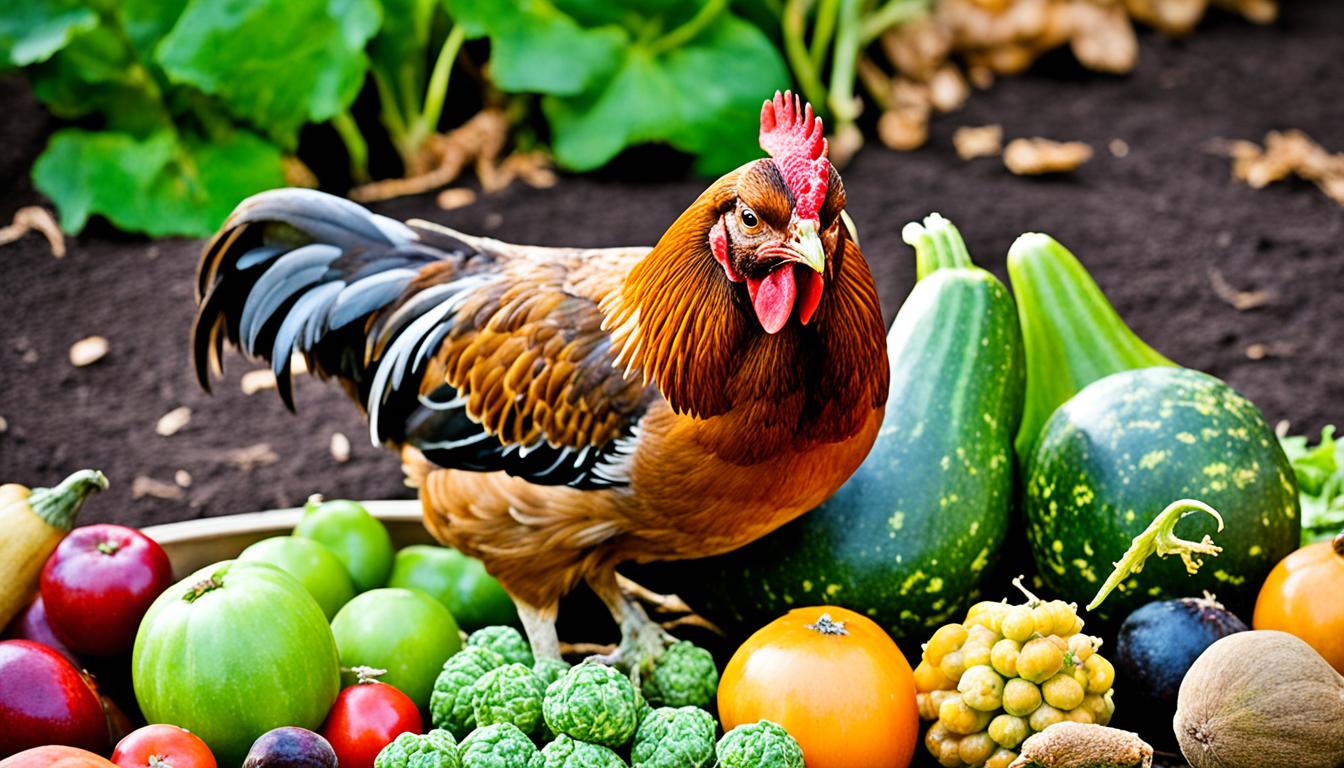
Did you know that gourds, including pumpkins and other squash varieties, can be a healthy and safe snack for chickens? These feathery friends can enjoy the flesh, seeds, and even the skin of gourds, providing them with a nutritious treat. However, it’s important to be cautious and avoid feeding chickens moldy, decorated, or painted gourds, as these can be harmful to their health. In this guide, we’ll explore what chickens can eat, the dos and don’ts of feeding treats, and provide you with a list of safe and healthy options.
Key Takeaways:
- Gourds like pumpkins and squash varieties can be a healthy and safe snack for chickens.
- Chickens can consume the flesh, seeds, and skin of gourds.
- Avoid feeding chickens moldy, decorated, or painted gourds.
- Feeding treats should be done in moderation, with a focus on natural and wholesome options.
- A high-quality complete feed should always be the primary source of nutrients for chickens.
What Should Chickens Eat?
Chickens have a similar digestive system to humans and can eat a wide variety of foods. It’s important to ensure they receive a balanced and nutritious diet to maintain their health and wellbeing. While a complete poultry feed should be the primary source of nutrients for chickens, they can also enjoy other foods to supplement their diet.
The Importance of a Complete Feed
A complete poultry feed is specially formulated to provide chickens with all the necessary nutrients in the correct proportions. It contains a balanced combination of grains, proteins, vitamins, and minerals, ensuring optimal growth, egg production, and overall health. Feeding chickens a complete feed is essential for meeting their nutritional requirements and preventing deficiencies.
Fruits and Vegetables for Added Nutrition
In addition to a complete feed, chickens can benefit from the consumption of fresh fruits and vegetables. These provide additional vitamins, minerals, and fiber to their diet. Fruits like apples, watermelon, and berries are rich in antioxidants and can be offered as treats or added to their feed. Vegetables such as leafy greens, carrots, and cucumbers are also excellent choices and can be given raw or cooked.
Cooked Foods and Scraps
Cooked foods can be a tasty and nutritious treat for chickens. Leftover rice, pasta, or mashed potatoes are safe options that can be mixed with their feed or given separately. However, it’s important to avoid giving them spicy or heavily seasoned foods as it can upset their stomachs. Additionally, chickens can consume certain kitchen scraps like vegetable peels or trimmings, as long as they are free from any harmful substances or pesticides.
Treats in Moderation
While it’s tempting to spoil chickens with treats, it’s essential to remember that they should only make up a small portion of their overall diet. Too many treats can disrupt the balance of nutrients and lead to nutritional deficiencies. Treats should never exceed 10% of their total food intake, with the remaining 90% being a complete feed.
Feeding treats to chickens can be a wonderful way to bond with them, but it’s important to do so in moderation.
Meats as Occasional Treats
Chickens can also enjoy small amounts of cooked meat as treats. However, it’s crucial to avoid giving them large portions of uncooked meat, as it may contain harmful bacteria and increase the risk of contamination. Cooked chicken, turkey, or even small pieces of cooked beef or pork can be offered as a special treat, ensuring it is given sparingly and in small, bite-sized pieces.
Overall, a balanced diet consisting of a complete poultry feed, supplemented with fresh fruits, vegetables, and occasional treats, will provide chickens with the necessary nutrition for optimal health and productivity.
The Good List: What Chickens Can Eat
Chickens are not picky eaters and can enjoy a wide range of foods that are safe and beneficial for their health. Including fresh fruits, vegetables, and leafy greens in their diet can provide them with vital nutrients and keep them happy and healthy. They can relish a variety of fruits such as juicy apples, succulent pears, and nutrient-rich pumpkins. Vegetables like crunchy lettuce, sweet carrots, and nutritious broccoli are also excellent choices for chickens.
“Chickens can eat almost anything that humans can eat.”
Cooked foods are often more palatable and safer for chickens to eat. They can indulge in cooked meats occasionally, but it is important to ensure that the meats are not moldy or rancid. A high-quality feed should always be the primary source of nutrients for chickens, supplemented by these tasty treats.
To summarize, here is a comprehensive list of foods that chickens can enjoy:
- Fruits, such as apples, pears, and pumpkins
- Vegetables, including lettuce, carrots, and broccoli
- Cooked meats (in moderation)
Feeding chickens these nutritious foods will contribute to their overall well-being and ensure they receive a balanced diet.
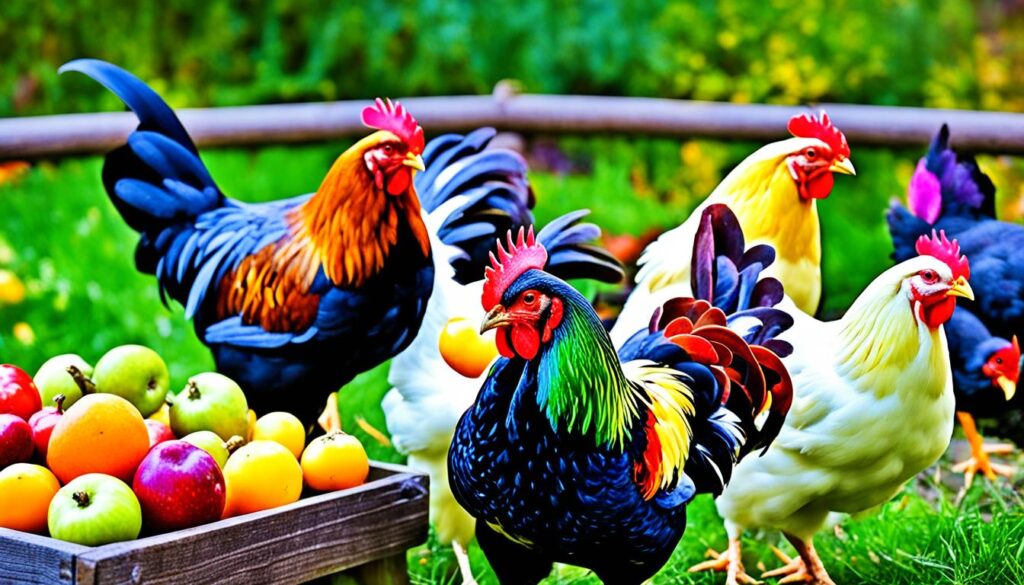
The Bad List: What Chickens Should Avoid Eating
While chickens are omnivorous and can eat a wide range of foods, there are some items that they should avoid consuming. It’s important to be aware of these foods to ensure the health and well-being of your chickens. The bad list includes raw beans, salty foods, and moldy foods.
1. Raw Beans
Chickens should avoid consuming raw beans, especially pinto beans, soybeans, and navy beans. Raw beans contain an anti-nutritional factor called lectin, which can hinder digestion. Cooking beans destroys this lectin and makes them safe for chickens to eat in moderation. It’s essential to thoroughly cook beans before offering them to your flock.
2. Salty Foods
Chickens have a delicate salt balance in their bodies, and excessive salt intake can disrupt this balance. Salty foods can cause chickens to increase their water intake, leading to watery droppings. It’s best to avoid feeding chickens foods that are high in salt, such as processed snacks, salty chips, or cured meats. Instead, opt for natural and low-sodium treats that won’t jeopardize their health.
3. Moldy Foods
Moldy foods should be strictly avoided in a chicken’s diet. Mold can produce mycotoxins that are harmful to chickens and can lead to various health issues. It’s crucial to regularly check and properly store your chicken’s food to prevent mold growth. If you notice any mold or signs of spoilage, discard the food immediately.
“It’s important to be cautious when feeding treats to chickens and to avoid giving them foods that could affect the taste of their eggs or cause anemia if fed in large quantities.”
Feeding Treats and Anemia
While treats are a great way to reward and interact with your flock, it’s important to offer them in moderation. Feeding excessive amounts of treats, especially those high in certain nutrients, can lead to imbalances and even anemia in chickens. For instance, an excess of treats rich in calcium, such as dairy products, can interfere with the proper absorption of other essential nutrients. Therefore, it’s crucial to strike a balance and provide treats as a supplement to their balanced diet.
By avoiding raw beans, salty foods, and moldy foods, you can ensure that your chickens maintain a healthy diet and overall well-being. Remember to prioritize a complete feed that meets their nutritional needs and use treats as occasional supplements. Your feathered friends will thank you for providing them with safe and nutritious meals.
| Foods to Avoid | Reasons |
|---|---|
| Raw Beans | Contain anti-nutritional factors that hinder digestion |
| Salty Foods | Disrupt the delicate salt balance in chickens’ bodies |
| Moldy Foods | Can produce harmful mycotoxins |
Guidelines for Feeding Chickens Treats
Feeding treats to chickens can be a wonderful way to bond with them, but it’s important to do so in moderation. Follow these guidelines to ensure a balanced and nutritious diet for your feathered friends.
1. Treats Should be Limited
When offering treats to chickens, remember that they should make up no more than 10% of their overall diet. The remaining 90% should come from a high-quality complete feed that provides all the essential nutrients.
2. Choose Natural and Wholesome Options
When selecting treats for chickens, opt for natural, healthy, and wholesome options that complement their diet. Look for treats that contain a mix of grains, vitamins, minerals, and amino acids to provide additional nutrition.
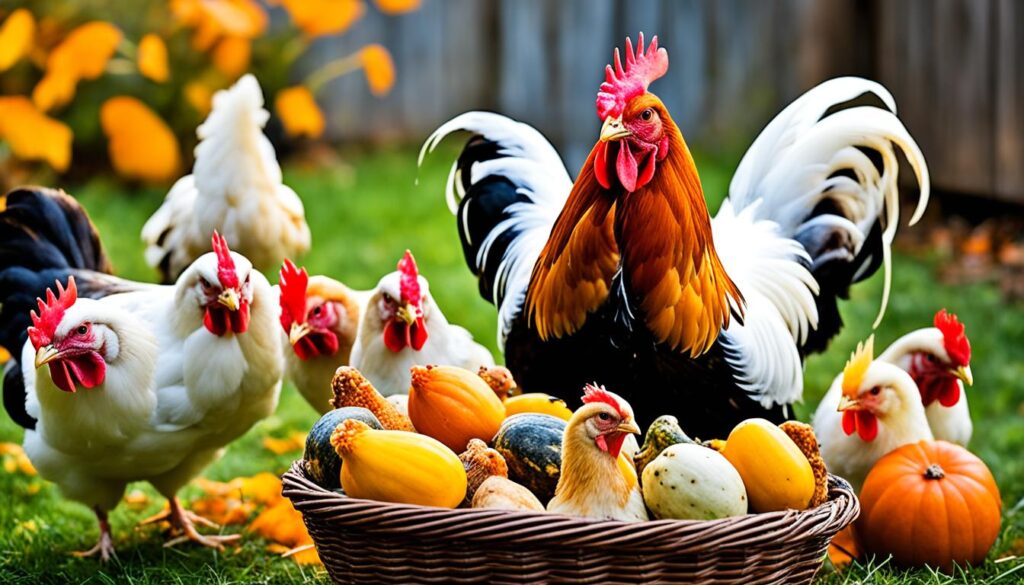
3. Provide Treats in the Morning
Offer treats to chickens in the morning before they go out exploring. This ensures that they still consume their complete feed throughout the day and receive all the necessary nutrients.
“Feeding treats to chickens can be a fun and rewarding experience. Just remember to do it in moderation and choose treats that enhance their diet.” – Chicken owner
4. Be Mindful of Quantity
It’s important not to overfeed treats to chickens. While they may love the extra goodies, too many treats can disrupt their nutritional balance and lead to health issues. Stick to the 10% rule and provide treats sparingly.
5. Monitor Behavior and Health
Observe your chickens’ behavior and overall health when introducing treats. If you notice any negative changes, such as reduced appetite or digestive issues, it may be necessary to adjust or eliminate certain treats from their diet.
6. Use Treats as Training Tools
Treats can also be used as training tools for chickens. By associating treats with desired behaviors, you can reinforce positive actions and encourage cooperation.
By following these guidelines, you can ensure that your chickens receive treats in a controlled and responsible manner, keeping them happy, healthy, and well-nourished.
Best Treats for Chickens
When it comes to treating your chickens, it’s important to choose options that are natural, healthy, and wholesome. While scraps, scratch grains, and mealworms can be tempting treats, it’s essential to offer them in moderation to prevent any negative impact on their diet.
If you’re looking for a recommended option that provides a balanced nutritional boost for your feathered friends, consider Purina Farm to Flock Treats. These treats are designed to keep your chickens strong and healthy with a mix of grains, vitamins, minerals, and amino acids.
Feeding your chickens these high-quality treats not only offers them a delectable snack but also complements their complete feed. With the perfect blend of natural ingredients, Purina Farm to Flock Treats are an excellent addition to your chickens’ diet.
Nutritional Benefits of Purina Farm to Flock Treats:
| Treats | Nutritional Benefits |
|---|---|
| Scraps | Can be offered in small amounts, but may lack balanced nutrition |
| Scratch Grains | Can be given as a treat, but should not make up the majority of their diet |
| Mealworms | Provide protein, but should be given sparingly to avoid disrupting their diet |
| Purina Farm to Flock Treats | A balanced mix of grains, vitamins, minerals, and amino acids to support overall health |
With the nutritional benefits offered by Purina Farm to Flock Treats, you can provide your chickens with a safe and tasty snack that supports their well-being. Remember to always prioritize a high-quality complete feed as the main source of nutrients for your flock, with treats serving as a supplemental delight.
By choosing the best treats for your chickens, you can keep them happy, healthy, and thriving.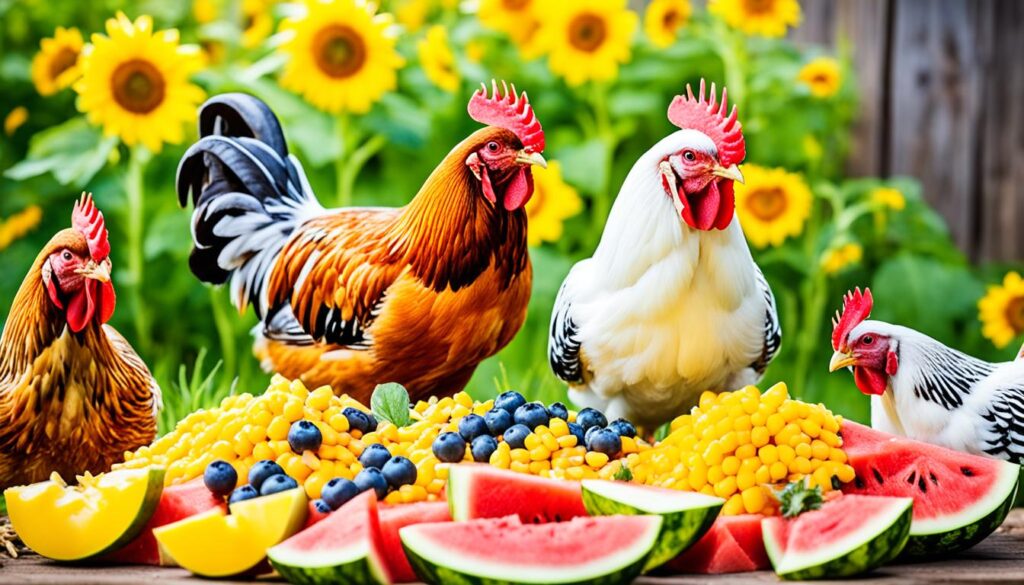
Foods to Avoid Feeding Chickens
When it comes to feeding chickens, it’s important to be aware of certain foods that should be avoided. These foods can be harmful to their health and well-being. Below are some key foods that you should refrain from feeding to your chickens:
- Bread: While bread may seem like a harmless treat, it has little nutritional value for chickens. Feeding them bread regularly can lead to nutritional deficiencies and can also cause deformities and crop blockages.
- Raw meat: Raw meat, including chicken, should be avoided in chickens’ diets. Raw meat may contain harmful bacteria such as salmonella, which can cause severe health issues in chickens.
- Raw eggs: Similarly, feeding raw eggs to chickens can pose a risk of salmonella contamination. It’s best to avoid providing them with raw eggs to prevent potential health problems.
- Avocado pits and skins: Avocado pits and skins contain a toxin called persin, which is toxic to chickens. Feeding them avocado pits and skins can have detrimental effects on their health. It’s best to remove these parts before giving avocados to your chickens.
By avoiding these foods in your chickens’ diet, you can ensure their health and well-being. It’s important to provide them with a balanced diet that consists of high-quality feeds, fresh fruits, vegetables, and appropriate treats.
| Foods | Reasons to Avoid |
|---|---|
| Bread | Little nutritional value and can cause deformities and crop blockages |
| Raw Meat | Risk of salmonella and other harmful bacteria |
| Raw Eggs | Risk of salmonella and other harmful bacteria |
| Avocado pits and skins | Contain persin, a toxin that is toxic to chickens |
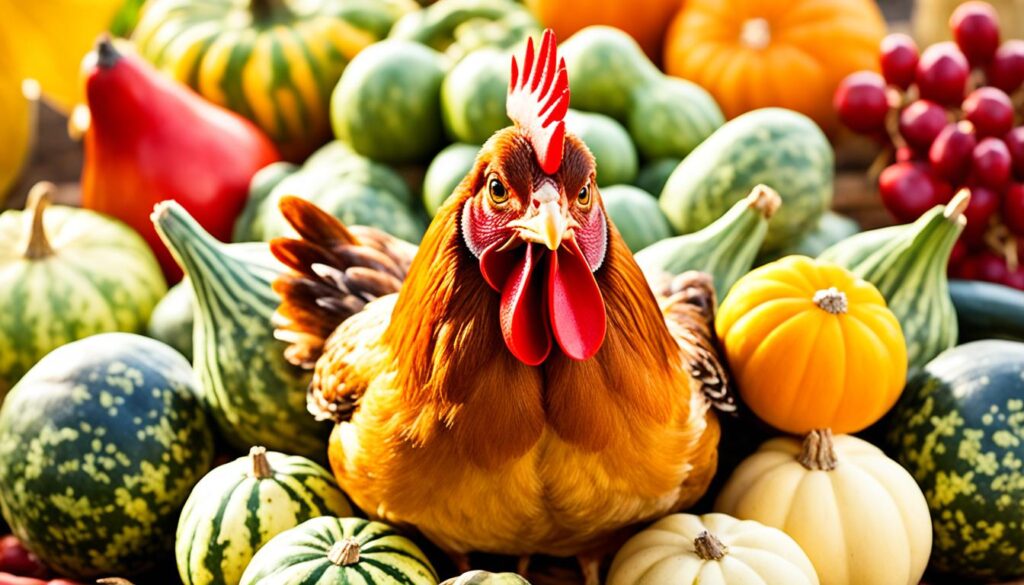
Foods That Are Toxic to Chickens and Ducks
While chickens and ducks can enjoy a wide variety of foods, it’s essential to be aware of the foods that can be toxic to them. Feeding these harmful foods to poultry can have serious consequences for their health and well-being. Here are some foods that you should avoid feeding to your chickens and ducks:
Bread:
Bread may be a common food for humans, but it is not suitable for chickens and ducks. While a small piece of bread as an occasional treat may not cause harm, feeding bread regularly or in large quantities can lead to several problems. Bread has little nutritional value for poultry and can cause digestive issues such as crop impaction. Additionally, feeding bread can contribute to nutrient imbalances in their diet, leading to deficiencies or other health issues over time.
Raw Meat:
Feeding raw meat to chickens and ducks is not recommended. Raw meat, including raw chicken or other poultry, can pose a significant risk of salmonella and other harmful bacteria. These bacteria can cause serious illnesses in birds, leading to infection, diarrhea, and even death. It is best to cook the meat thoroughly before offering it as a treat to ensure the safety of your poultry.
Raw Eggs:
While chickens and ducks may naturally consume their own eggs in certain circumstances, feeding them raw eggs can be problematic. Raw eggs can carry salmonella and other bacteria that can potentially harm the birds. It is essential to collect eggs promptly and prevent any cracked or broken eggs from being ingested by the flock.
Avocado Pits and Skins:
Avocado pits and skins contain a toxin called persin, which is toxic to both chickens and ducks. Feeding avocados or any part of the fruit to poultry can lead to serious health issues, including heart and respiratory problems, organ failure, and death. It is crucial to keep avocados away from your flock’s diet to ensure their safety and well-being.
By avoiding these toxic foods, you can protect the health of your chickens and ducks and ensure that they thrive in a safe and nurturing environment.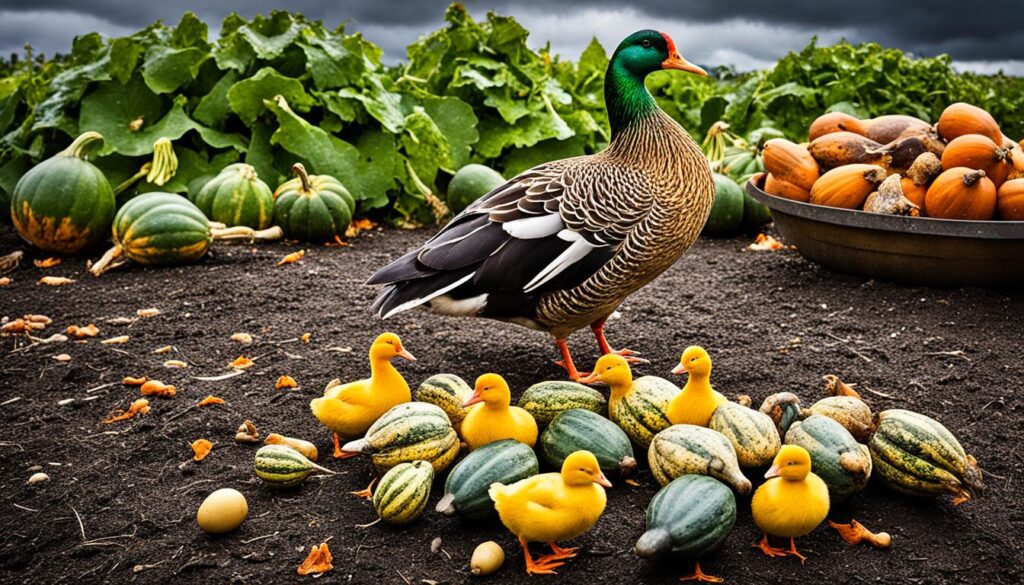
| Potentially Toxic Foods | Consequences for Chickens and Ducks |
|---|---|
| Bread | Crop impaction and nutrient imbalances |
| Raw Meat | Risk of salmonella and other harmful bacteria |
| Raw Eggs | Risk of salmonella and potential infections |
| Avocado Pits and Skins | Heart and respiratory problems, organ failure, and death |
Safe Treats and Food for Chickens and Ducks
When it comes to feeding chickens and ducks, it’s essential to provide them with safe and nutritious treats. Offering a variety of grains, fruits, vegetables, and cooked meat can not only add flavor to their diet but also ensure their overall well-being. By incorporating these safe foods into their feeding routine, you can keep your feathered friends healthy and happy!
Grains: A Staple in Their Diet
Grains make an excellent addition to the diet of chickens and ducks. They are a valuable source of energy and can be easily digested. Consider including the following types of grains in their meals:
- Rice
- Wheat
- Corn
- Oats
These grains can be given as is or mixed with their regular feed to provide a wholesome treat that they’ll enjoy.
Fruits: Nature’s Sweet Treats
Fresh fruits are not only a delightful treat for chickens and ducks but also a great source of vitamins and minerals. While fruits should be given in moderation due to their sugar content, they can still be a healthy addition to their diet. Some safe fruits for your feathered friends include:
- Watermelon
- Strawberries
- Blueberries
These juicy treats can be chopped into bite-sized pieces and offered as a refreshing snack on hot summer days.
Vegetables: Adding Variety to Their Meals
Incorporating vegetables into the diet of chickens and ducks is an excellent way to provide them with essential nutrients. You can offer the following vegetables as safe and nutritious treats:
- Lettuce
- Kale
- Broccoli
- Carrots
These vegetables can be chopped or shredded and served raw or cooked. Just make sure to avoid any seasonings or additives that may be harmful to them.
Cooked Meat: A Protein-Packed Delight
Chickens and ducks are omnivores, meaning they can also enjoy small portions of cooked meat as a special treat. Remove any bones and excess fat before offering cooked meat to your feathered friends. Cut it into small pieces to make it easier for them to eat. Remember to avoid feeding them raw meat, as it can pose health risks.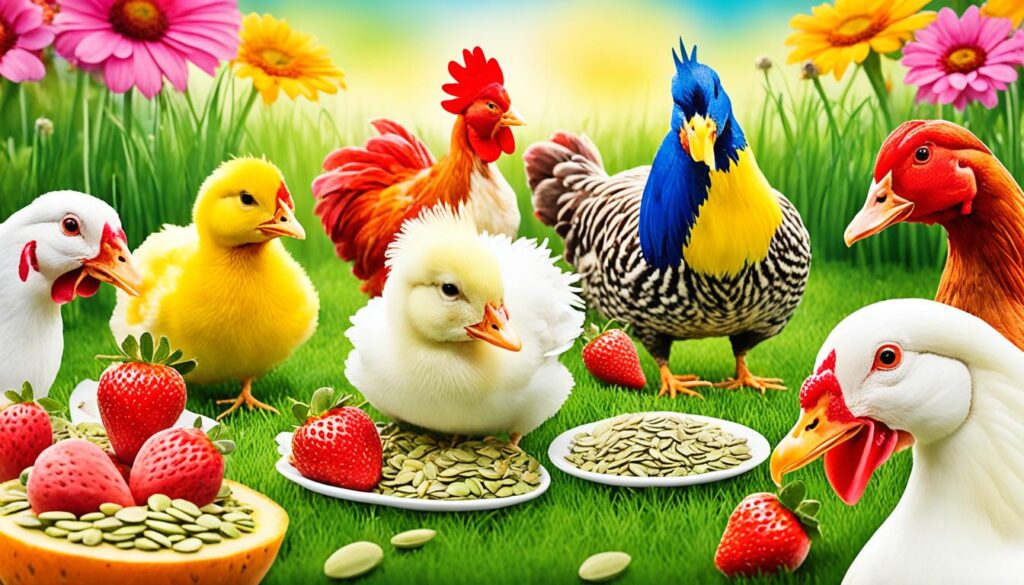
It’s important to note that treats should only constitute a small portion of their overall diet. The majority of their nutrition should come from a balanced and complete feed that provides them with all the necessary vitamins and minerals.
By offering safe treats and food options, you can ensure that your chickens and ducks enjoy a varied and nutritious diet, leading to their optimal health and happiness.
Conclusion
In conclusion, gourds such as pumpkins can be a safe and healthy snack for chickens. These versatile vegetables provide chickens with a range of nutrients as they can enjoy the flesh, seeds, and skin of gourds. However, it’s important to exercise caution and avoid feeding them moldy, decorated, or painted gourds, as these can be harmful to their health.
When it comes to treats, it’s crucial to feed them to chickens in moderation. Opt for natural and wholesome options that align with their dietary needs. Remember that a high-quality complete feed should always be the primary source of nutrients for chickens, providing the necessary balance of vitamins, minerals, and proteins.
By following these guidelines, you can ensure that your flock of chickens stays healthy, happy, and well-fed. Providing gourds and other safe snacks as treats can be a great way to diversify their diet and keep them satisfied. Remember to prioritize their overall nutrition by offering a high-quality complete feed, and supplement it with treats that add variety while maintaining their optimal health.FAQ
Can chickens eat gourds?
What should chickens eat?
What can chickens eat?
What foods should chickens avoid eating?
What are the guidelines for feeding chickens treats?
What are the best treats for chickens?
What foods should be avoided when feeding chickens?
What foods are toxic to chickens and ducks?
What are safe treats and food for chickens and ducks?
As our Editor-in-Chief, James plays a pivotal role in ensuring the quality and integrity of our content. With a keen eye for detail and a passion for storytelling, James oversees the editorial process here at A Place for Animals. With years of experience in content editing, James ensures that every piece of content meets our high standards of accuracy and clarity. Under James’ guidance, you can rest assured that the content you read is informative and impeccably crafted.
-

 Vetted2 months ago
Vetted2 months ago15 Best Cat Foods for Managing Hyperthyroidism – Vet Approved and Feline Friendly
-

 Animal Facts2 months ago
Animal Facts2 months agoSpring Animals: A Guide to Seasonal Wildlife
-

 Cats7 months ago
Cats7 months agoTop 5 Cat Breeders in Arkansas: A Guide
-
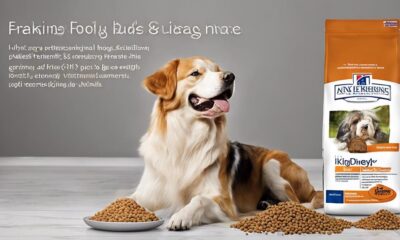
 Vetted1 month ago
Vetted1 month ago15 Best Dog Foods for Kidney Disease – Expert Recommendations for Your Pet's Health
-

 Vetted2 months ago
Vetted2 months ago15 Best Fresh Dog Food Delivery Services for Your Pup's Health and Happiness
-

 Rabbits2 months ago
Rabbits2 months agoExploring Rabbit Holes: What Do They Look Like?
-
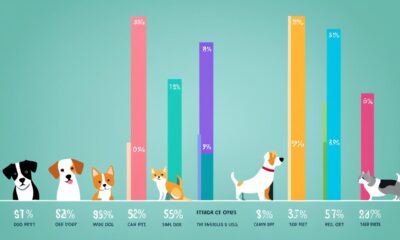
 Pets2 months ago
Pets2 months agoLatest Pet Statistics in US – Trends & Insights in 2024
-

 Fish2 months ago
Fish2 months agoKeeping Your Sucker Fish Thriving at Home






















